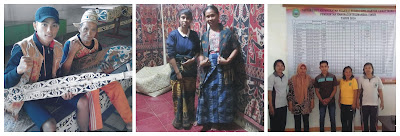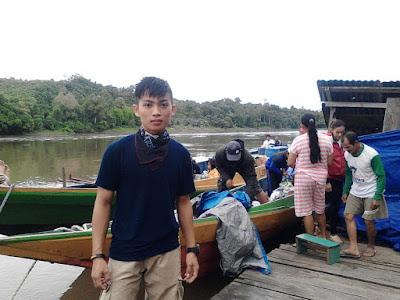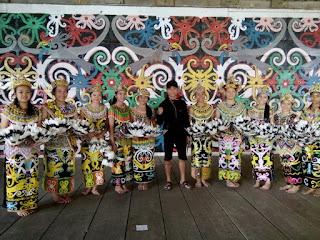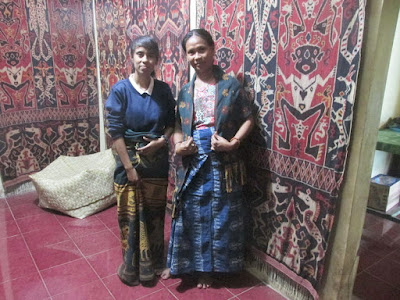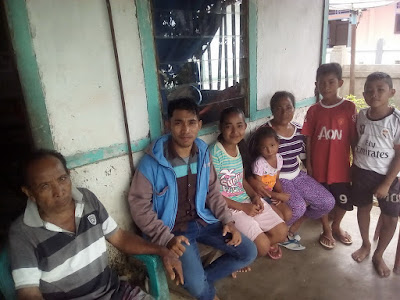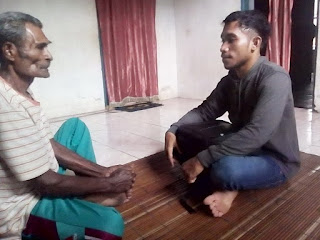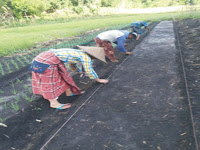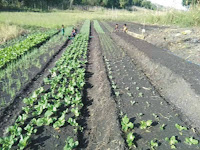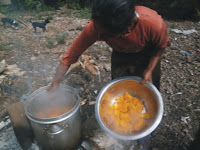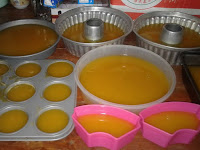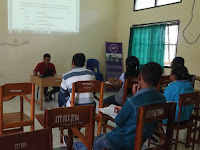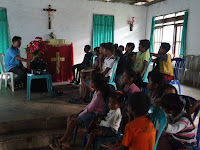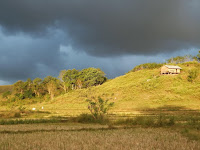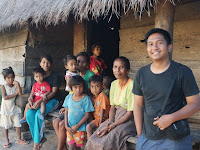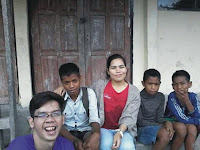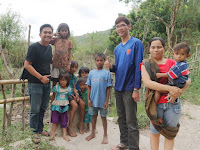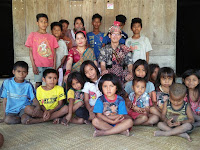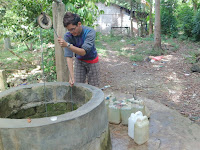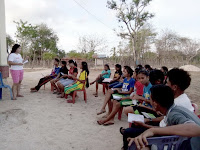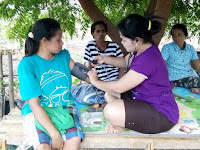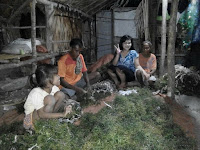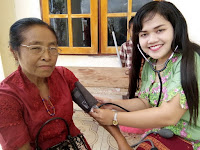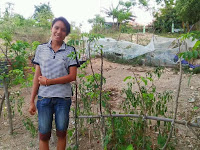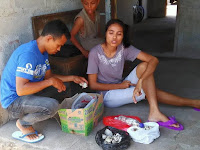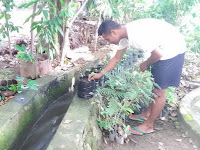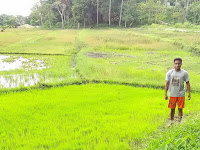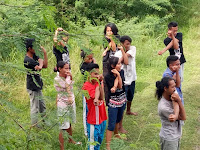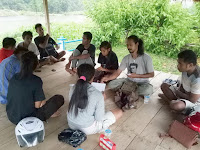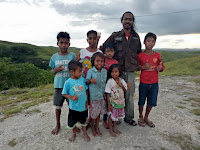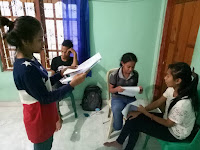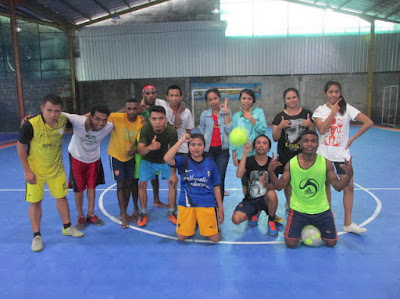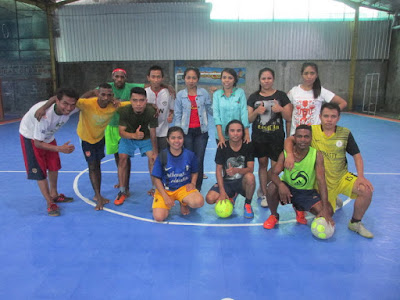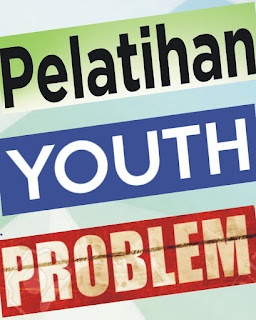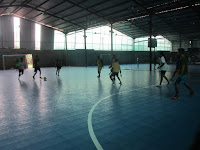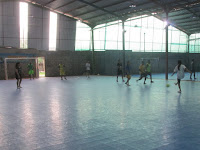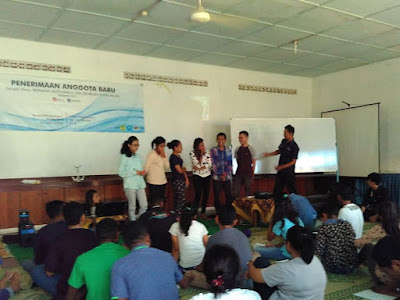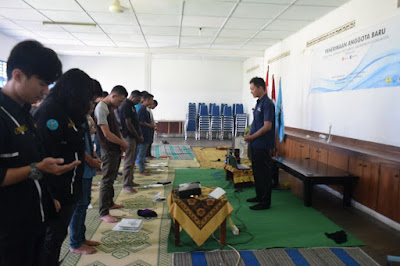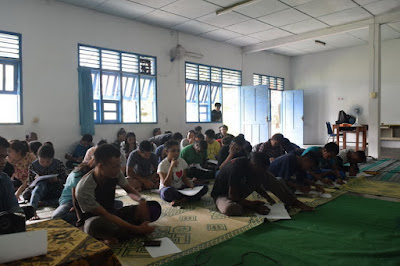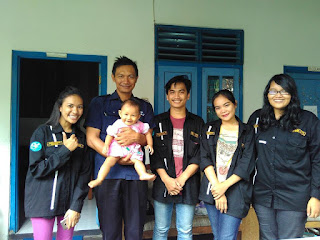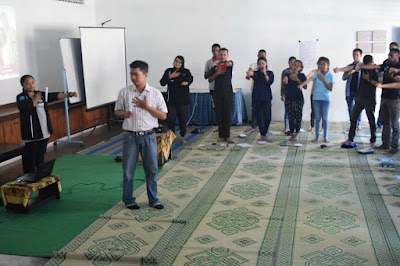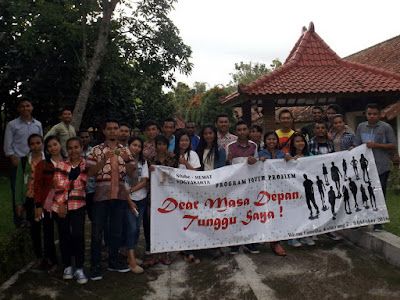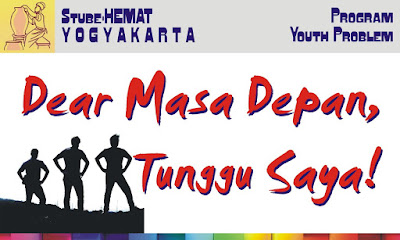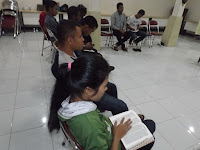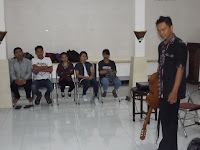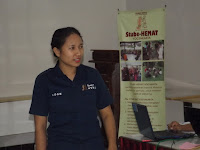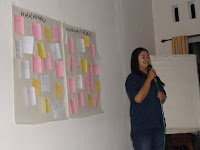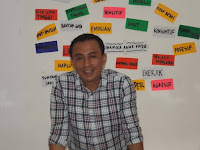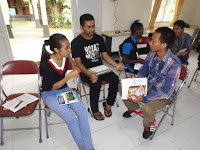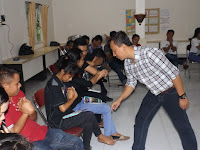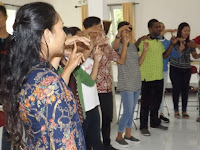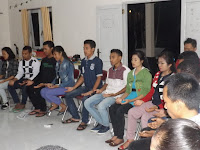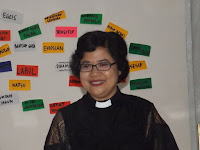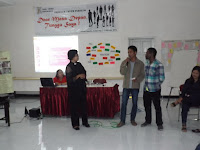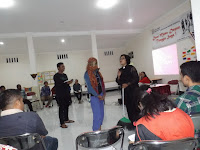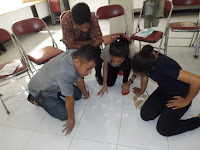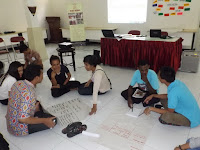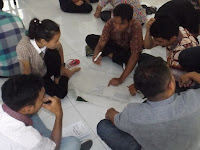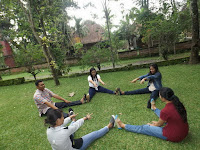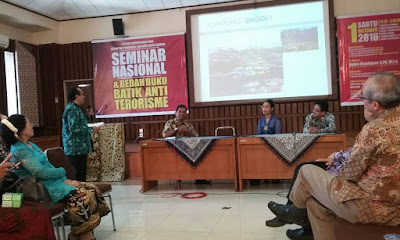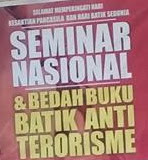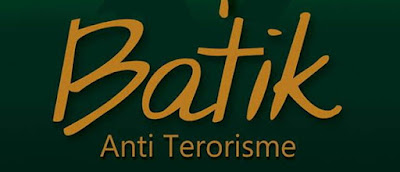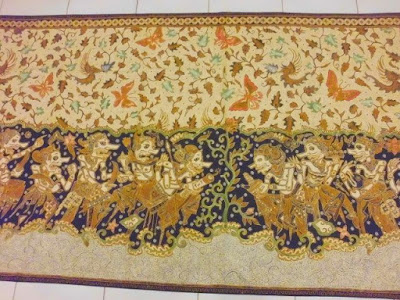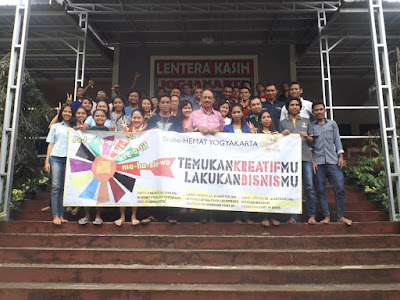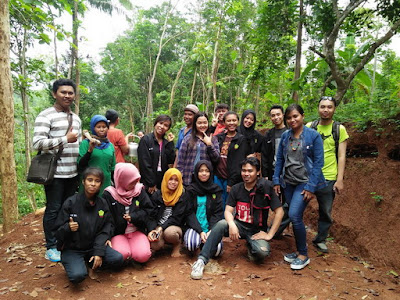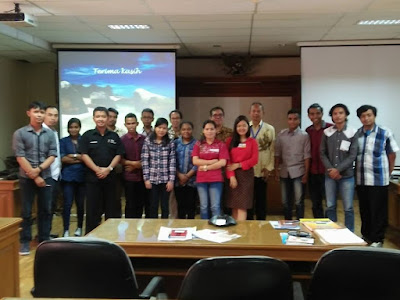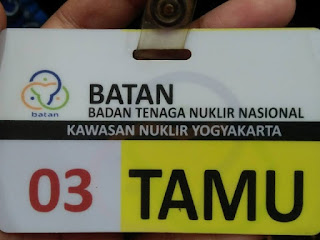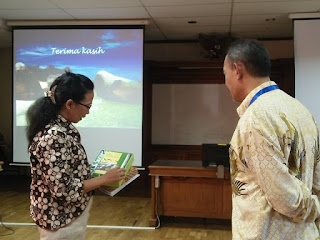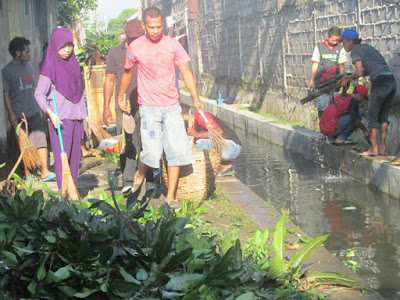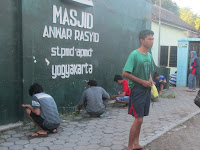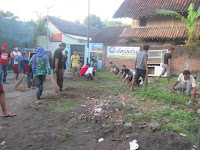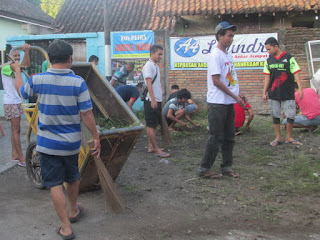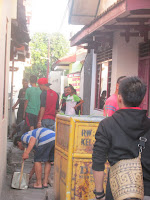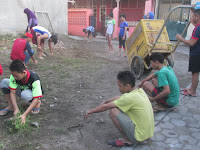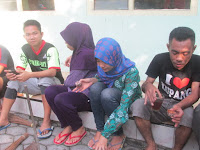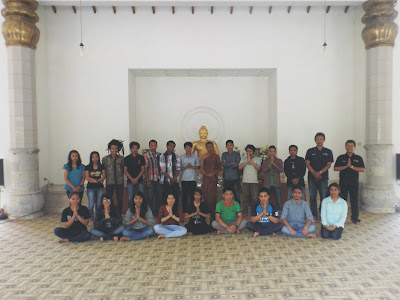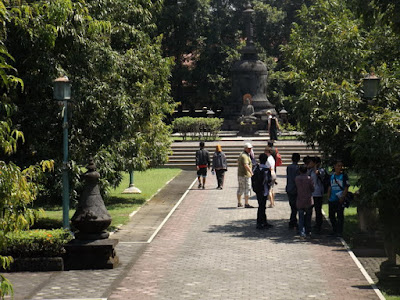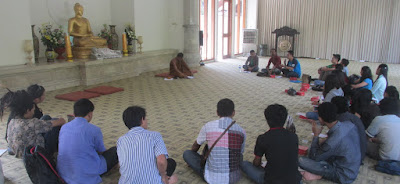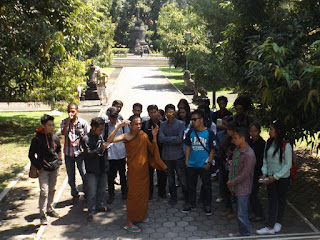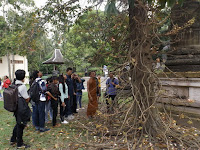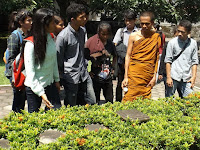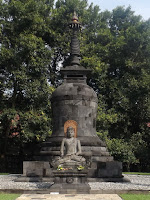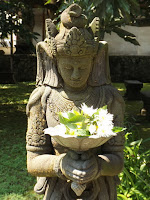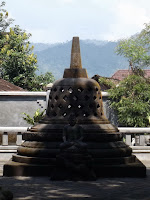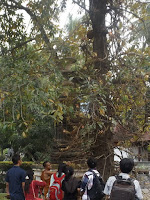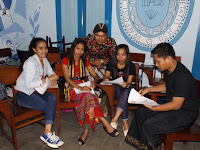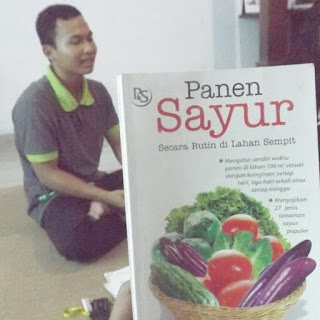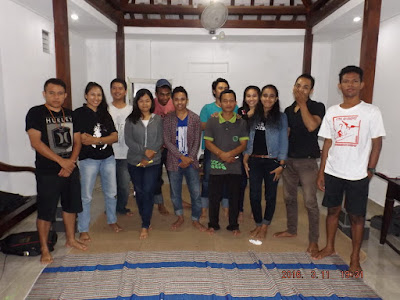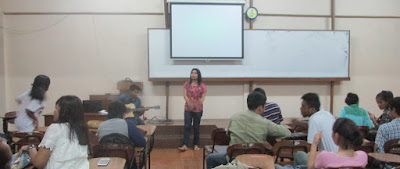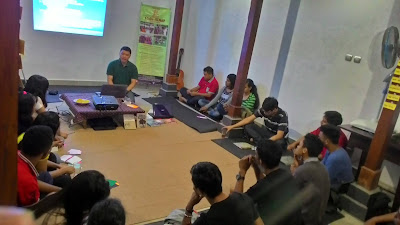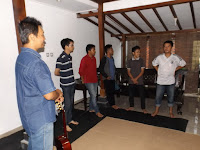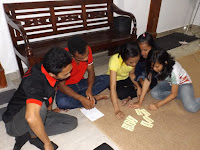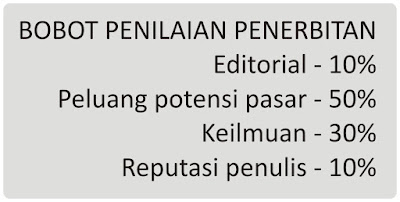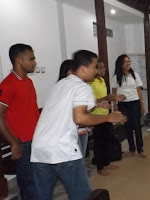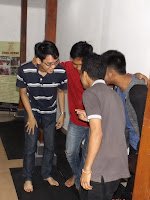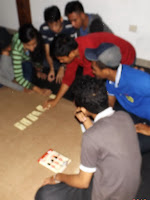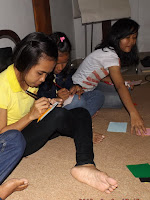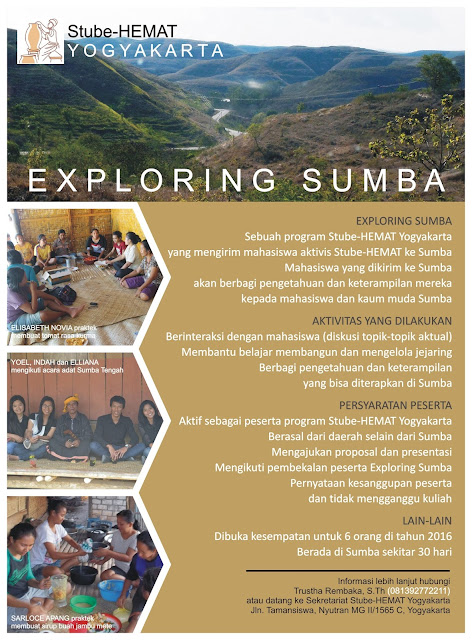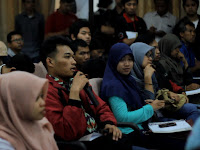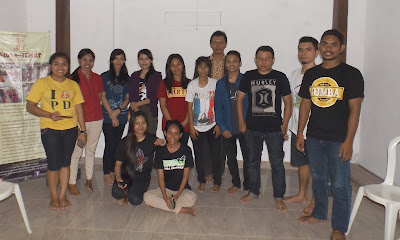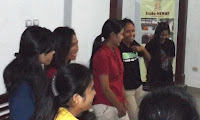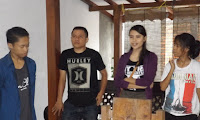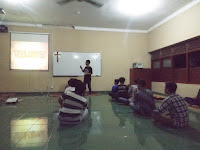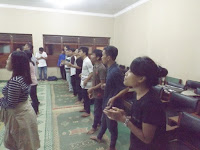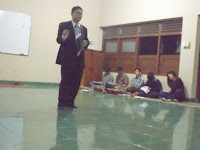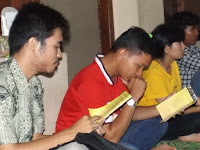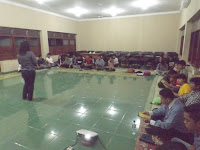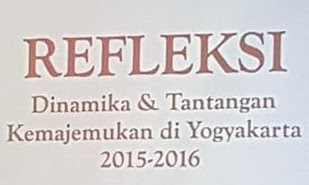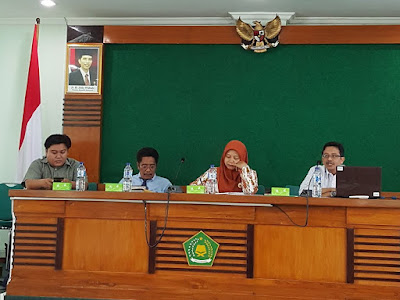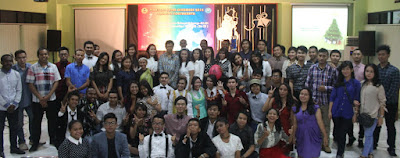by adminstube
 Agustinus Soleh, often called Agus, a student of governance science of STPMD APMD originating from Long Alango, Malinau, North Borneo. The trip to his hometown takes several days and it needs really a strong will. How comes? Well, he departed from Yogyakarta to Tarakan by plane, then by boat against river current from Tarakan to Bahau Hulu. Moreover, he and other passengers spent nights on the river bank and changed into smaller boat to avoid huge rocks along the river.
Agustinus Soleh, often called Agus, a student of governance science of STPMD APMD originating from Long Alango, Malinau, North Borneo. The trip to his hometown takes several days and it needs really a strong will. How comes? Well, he departed from Yogyakarta to Tarakan by plane, then by boat against river current from Tarakan to Bahau Hulu. Moreover, he and other passengers spent nights on the river bank and changed into smaller boat to avoid huge rocks along the river.
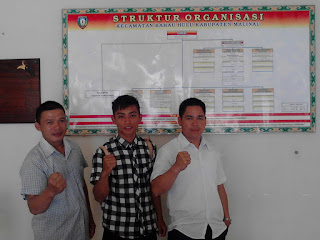 Arriving in his village, he mapped the potency of the villag, approached the villagers, interviewed village and local district staffs, local leaders, the head of customs, youth groups, women-children-youth dance groups, groups of craftmen and traditional music groups. He also took part in voluntary work of his village, trained traditional dance for children of elementary, junior and youth, performed single dance and observed Ulen forest land.
Arriving in his village, he mapped the potency of the villag, approached the villagers, interviewed village and local district staffs, local leaders, the head of customs, youth groups, women-children-youth dance groups, groups of craftmen and traditional music groups. He also took part in voluntary work of his village, trained traditional dance for children of elementary, junior and youth, performed single dance and observed Ulen forest land.
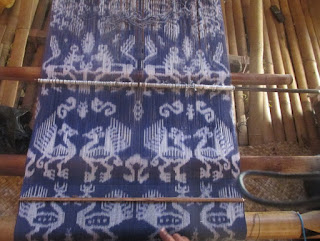 Elisabeth Uru Ndaya studies in Sarjanawiyata Tamansiswa University, Yogyakarta, majoring English Education. She is interested to learn more about traditional woven cloth, because she found a fact that most young people of Sumba like to wear it, but they don’t know the meaning of the motives. Even worse, the cloth motif they are wearing has inappropriate meaning with the event they attend. It is ironic, as actually the woven cloth is their own unique cultural heritage from East Sumba.
Elisabeth Uru Ndaya studies in Sarjanawiyata Tamansiswa University, Yogyakarta, majoring English Education. She is interested to learn more about traditional woven cloth, because she found a fact that most young people of Sumba like to wear it, but they don’t know the meaning of the motives. Even worse, the cloth motif they are wearing has inappropriate meaning with the event they attend. It is ironic, as actually the woven cloth is their own unique cultural heritage from East Sumba.
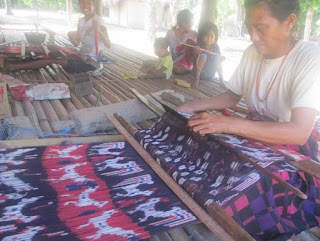 During holiday she determined to learn traditional woven cloth by visiting traditional woven cloth kampongs such as Kalu, Prailiu, Padadita and Palindi in Kambera district, Waingapu. After few weeks of learning she found various images with their meanings, such as, a crocodile symbolizes the glory of king, people walking besides buffaloes symbolizes slave, skull symbolizes war, hen symbolizes ritual belief of Marapu, horse symbolizes animal in Sumbanese’s life and mamuli symbolizes customary marriage dowry.
During holiday she determined to learn traditional woven cloth by visiting traditional woven cloth kampongs such as Kalu, Prailiu, Padadita and Palindi in Kambera district, Waingapu. After few weeks of learning she found various images with their meanings, such as, a crocodile symbolizes the glory of king, people walking besides buffaloes symbolizes slave, skull symbolizes war, hen symbolizes ritual belief of Marapu, horse symbolizes animal in Sumbanese’s life and mamuli symbolizes customary marriage dowry.
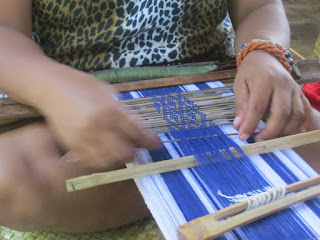 The process of weaving requires tools and materials, such as piapak (bobbin), Wanggi pamening (spinner), Kapala (binder for threads), tenung (loom), wurung (soaking basin), lesung (pestle), smooth thread (silk), raw yarn (wool), roots of Morinda citrifolia (kombu, red colouring), leaf lira (wora, blue colouring), ijju and pecan trees (yellow colouring) and lime for preservatives.
The process of weaving requires tools and materials, such as piapak (bobbin), Wanggi pamening (spinner), Kapala (binder for threads), tenung (loom), wurung (soaking basin), lesung (pestle), smooth thread (silk), raw yarn (wool), roots of Morinda citrifolia (kombu, red colouring), leaf lira (wora, blue colouring), ijju and pecan trees (yellow colouring) and lime for preservatives.
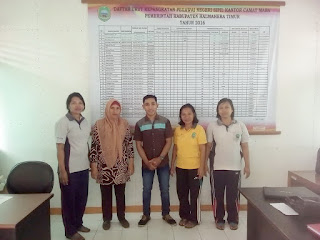 Johain Pekaulang, a fresh graduate student, majoring Law from University of Janabadra Yogyakarta. He comes from Buli, East Halmahera, North Maluku. In accordance with his study background, he wants to know how far is the implementation of traditional law in Buli to solve criminal cases as time goes by.
Johain Pekaulang, a fresh graduate student, majoring Law from University of Janabadra Yogyakarta. He comes from Buli, East Halmahera, North Maluku. In accordance with his study background, he wants to know how far is the implementation of traditional law in Buli to solve criminal cases as time goes by.
Around in 1980 people of Buli still adhered local customs. In case of violation or crime, they often settled peacefully between perpetrator and victim, or pay the customary fine. In addition, when there is a wedding, the music often played is lalayon music and accompanied by lalayon and cakalele dance. Working together is still commonly found and a system of barter is still valid. However, in the period of 1990-2000, the development of era and influence of foreign culture gave significant impact; the traditional law in Buli was slowly abandoned. So, in case of violation or crime, they tend to resolve it using national law. Lalayon music and lalayon was rarely played anymore.
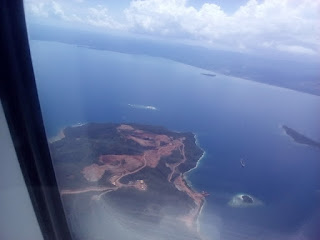 At the beginning Johain hypothesized that when he returned home to Buli, he will only find case of fighting and free sex among young people, but it turned out to be more increasing cases of corruption, theft , unfair competition between young people and organization, thwart to one another, village negligence and egoism that tends to take profits for themselves. These conditions made him sad and compelled him to return back to teach young people knowledge and experience for the sake of awakening characters toward a better Buli society and young people have useful life for the community.
At the beginning Johain hypothesized that when he returned home to Buli, he will only find case of fighting and free sex among young people, but it turned out to be more increasing cases of corruption, theft , unfair competition between young people and organization, thwart to one another, village negligence and egoism that tends to take profits for themselves. These conditions made him sad and compelled him to return back to teach young people knowledge and experience for the sake of awakening characters toward a better Buli society and young people have useful life for the community.
by adminstube
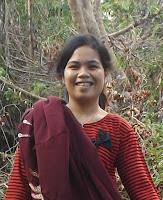 The first is Junita Samosir, a graduated agrotechnology student of Mercu Buana Yogyakarta University. In Sumba, she shared her knowledge about the cultivation of organic vegetables to people in Laimbonga, East Sumba. She held practices making pilot garden involving the local people, also observed land availability, land preparation, seed preparation and watering until the treatment of plants. It is nearly one month to harvest it along with the local people. In addition, Junita also trained some woman to process yellow pumpkins into pudding because of its very high nutrient, especially as a source of carbohydrates, vitamins and minerals. The people were so excited to process pumpkin because it is usually served as boiled food or for their pigs feed.
The first is Junita Samosir, a graduated agrotechnology student of Mercu Buana Yogyakarta University. In Sumba, she shared her knowledge about the cultivation of organic vegetables to people in Laimbonga, East Sumba. She held practices making pilot garden involving the local people, also observed land availability, land preparation, seed preparation and watering until the treatment of plants. It is nearly one month to harvest it along with the local people. In addition, Junita also trained some woman to process yellow pumpkins into pudding because of its very high nutrient, especially as a source of carbohydrates, vitamins and minerals. The people were so excited to process pumpkin because it is usually served as boiled food or for their pigs feed.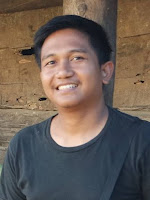 The second is Resky Julius, a Management student of Duta Wacana Christian University. He is coming from Toraja, Sulawesi. There were two activities he did in Sumba, that is, sharing the experience how to write curriculum vitae with students of STT GKS and documenting a variety of interesting things in Sumba, such as culture, crafts and natural landscapes. Curriculum Vitae is important as a form of personal preparation for entering the job world as well as creating employment opportunities.
The second is Resky Julius, a Management student of Duta Wacana Christian University. He is coming from Toraja, Sulawesi. There were two activities he did in Sumba, that is, sharing the experience how to write curriculum vitae with students of STT GKS and documenting a variety of interesting things in Sumba, such as culture, crafts and natural landscapes. Curriculum Vitae is important as a form of personal preparation for entering the job world as well as creating employment opportunities.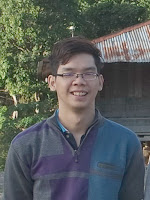 The third participant is Christian Badai Bulin, an Information Technology Student of Duta Wacana Christian University. He comes from Pontianak, West Kalimantan. He made a couple of short videos telling about Sumba, such as Marapu customary burial, the atmosphere of one beach in Sumba and processions using traditional clothe. He hoped that the short videos can be used as documentation and tourism promotion in Sumba.
The third participant is Christian Badai Bulin, an Information Technology Student of Duta Wacana Christian University. He comes from Pontianak, West Kalimantan. He made a couple of short videos telling about Sumba, such as Marapu customary burial, the atmosphere of one beach in Sumba and processions using traditional clothe. He hoped that the short videos can be used as documentation and tourism promotion in Sumba.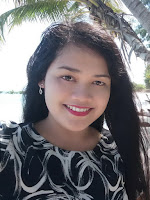 The Sumbanese’s health condition became the concern of Imelda Dewi Susanti, from Sekadau, West Kalimantan, as the fourth participant. She is a graduate student from Health Institute of Bethesda Yogyakarta. She shared her experiences with the local community and the congregation members of GKS Kaliuda, East Sumba, to recognize the hereditary diseases (hypertension and diabetes mellitus) and the treatment including herbal beverage by processing pumpkins. In addition, she also taught people how to have a clean and healthy lifestyle, checked blood pressure and did gymnastic together with young people in Kaliuda.
The Sumbanese’s health condition became the concern of Imelda Dewi Susanti, from Sekadau, West Kalimantan, as the fourth participant. She is a graduate student from Health Institute of Bethesda Yogyakarta. She shared her experiences with the local community and the congregation members of GKS Kaliuda, East Sumba, to recognize the hereditary diseases (hypertension and diabetes mellitus) and the treatment including herbal beverage by processing pumpkins. In addition, she also taught people how to have a clean and healthy lifestyle, checked blood pressure and did gymnastic together with young people in Kaliuda.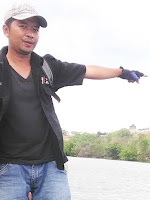 The fifth participant is Yohanes Dian Alpasa, a theology alumnus of Duta Wacana Christian University. He is from Bengkulu, Sumatera. He met and interviewed some activists of Stube-HEMAT Sumba who participated Exposure to Stube-HEMAT Yogyakarta in the period of 2010-2016. It is done to find out whether the program was beneficial and applicable in their origin area. Twenty-nine participants were interviewed directly, nine persons were interviewed by phone and two persons could not be interviewed becuase they worked in different island.
The fifth participant is Yohanes Dian Alpasa, a theology alumnus of Duta Wacana Christian University. He is from Bengkulu, Sumatera. He met and interviewed some activists of Stube-HEMAT Sumba who participated Exposure to Stube-HEMAT Yogyakarta in the period of 2010-2016. It is done to find out whether the program was beneficial and applicable in their origin area. Twenty-nine participants were interviewed directly, nine persons were interviewed by phone and two persons could not be interviewed becuase they worked in different island.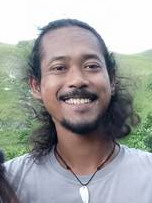 The sixth participant is Vicky Tri Samekto, a theological graduated student of Christian Institute of Marturia, Yogyakarta. With his theatrical skill, Vicky tried to encourage and to provide a forum for young people to express themselves through their voice and body. The theater exercises became simple practices of self-expression. Of course, the expression issued was related to social theme and young children.
The sixth participant is Vicky Tri Samekto, a theological graduated student of Christian Institute of Marturia, Yogyakarta. With his theatrical skill, Vicky tried to encourage and to provide a forum for young people to express themselves through their voice and body. The theater exercises became simple practices of self-expression. Of course, the expression issued was related to social theme and young children.by adminstube
 'Experiential Learning' became one of the teaching methods that Stube-HEMAT does when implementing programs. This method gives added value to students who participate in the program, because they can interact directly with the person and finding personal experiences that will give them impression and reflection.
'Experiential Learning' became one of the teaching methods that Stube-HEMAT does when implementing programs. This method gives added value to students who participate in the program, because they can interact directly with the person and finding personal experiences that will give them impression and reflection.
 This method was applied by Stube-HEMAT Yogyakarta in Human Rights program on December 2-4, 2016. The training was held at Hotel Cailendra Extension, Yogyakarta and it was continued with the activity of live-in with ‘Sedulur Sikep’ in Sukolilo, Pati, Central Java, which was attended by twenty three students from various campus in Yogyakarta.
This method was applied by Stube-HEMAT Yogyakarta in Human Rights program on December 2-4, 2016. The training was held at Hotel Cailendra Extension, Yogyakarta and it was continued with the activity of live-in with ‘Sedulur Sikep’ in Sukolilo, Pati, Central Java, which was attended by twenty three students from various campus in Yogyakarta.
 Dr. Budiawan, a lecturer of Culture and Media Studies, Gadjah Mada University Graduate School described a brief history of Samin community, other terms for ‘Sedulur Sikep’. Pioneered by Samin Surosentiko who fought against Dutch Colonialism on tax levy, Samin community keep their uniquely non-violent opposition. This movement continued to grow and eventually the Dutch troops arrested Samin Surosentiko and exiled to Sawahlunto, West Sumatra. Nevertheless the Samin’s thought continues to be followed by the faithful community even until today. The term of Samin itself, is a term used by outsiders view, while the internal community name themselves as Sedulur Sikep.
Dr. Budiawan, a lecturer of Culture and Media Studies, Gadjah Mada University Graduate School described a brief history of Samin community, other terms for ‘Sedulur Sikep’. Pioneered by Samin Surosentiko who fought against Dutch Colonialism on tax levy, Samin community keep their uniquely non-violent opposition. This movement continued to grow and eventually the Dutch troops arrested Samin Surosentiko and exiled to Sawahlunto, West Sumatra. Nevertheless the Samin’s thought continues to be followed by the faithful community even until today. The term of Samin itself, is a term used by outsiders view, while the internal community name themselves as Sedulur Sikep.
 Ariani Narwastujati, executive director of Stube-HEMAT expressed gratitude to Sedulur Sikep for the opportunity for the students to do activities and to know Sedulur Sikep community in Sukolilo. We want to learn values of life, simplicity, honesty, the system of local community life and passion for agriculture and environment.
Ariani Narwastujati, executive director of Stube-HEMAT expressed gratitude to Sedulur Sikep for the opportunity for the students to do activities and to know Sedulur Sikep community in Sukolilo. We want to learn values of life, simplicity, honesty, the system of local community life and passion for agriculture and environment.
 Gunritno revealed that the Sedulur Sikep welcome the students and provide opportunity to learn together with them and the student can accept and adapt to the situation. He hoped that the learning process does not stop when the Live-in activity ended, but continued by follow-up done by the students. He talked about the principles as Sedulur Sikep, should live honestly (of thoughts, words, and actions), ora srei, drengki, tukar padu, dahpen kemeren, mbedog colong (Javanese). These mean no envy, no jealousy, no squabble with other (even fighting), not cheating, not stealing, and always doing good and right deeds.
Gunritno revealed that the Sedulur Sikep welcome the students and provide opportunity to learn together with them and the student can accept and adapt to the situation. He hoped that the learning process does not stop when the Live-in activity ended, but continued by follow-up done by the students. He talked about the principles as Sedulur Sikep, should live honestly (of thoughts, words, and actions), ora srei, drengki, tukar padu, dahpen kemeren, mbedog colong (Javanese). These mean no envy, no jealousy, no squabble with other (even fighting), not cheating, not stealing, and always doing good and right deeds.

 Many interesting stories experienced by the participants who stay at four different places of Sedulur Sikep families. First, at Mbak Siti’s house at Bombong, the participants found independence and role of a tough woman, able to work well in agricultural land, and did not hesitate to take part in constructing the house. In this house, the cooking fuel uses bio gas from cows' dunk owned by this family.
Many interesting stories experienced by the participants who stay at four different places of Sedulur Sikep families. First, at Mbak Siti’s house at Bombong, the participants found independence and role of a tough woman, able to work well in agricultural land, and did not hesitate to take part in constructing the house. In this house, the cooking fuel uses bio gas from cows' dunk owned by this family.

 Second, in Mrs. Gunarti’s house at Bowong. Besides finding the passion of Sedulur Sikep community to work as a farmer merely, the participants also found the fact that the children in Sedulur Sikep did not go to formal school, but they are educated in the family and community about the attitude of living, such as honest, humble, not being arrogant, not being envious and not taking other’s property.
Second, in Mrs. Gunarti’s house at Bowong. Besides finding the passion of Sedulur Sikep community to work as a farmer merely, the participants also found the fact that the children in Sedulur Sikep did not go to formal school, but they are educated in the family and community about the attitude of living, such as honest, humble, not being arrogant, not being envious and not taking other’s property.

 While at Mr Wargono’s house at Galiran, first participants faced trouble in communicating with Sedulur Sikep, because they commonly use Javanese language, however they finally were able to establish close relation. Female participants learned to use cloth, because Sedulur Sikep community has principle that trousers are men's wear. Participants found friendliness and close kinship during visiting other houses of Sedulur Sikep families at Galiran.
While at Mr Wargono’s house at Galiran, first participants faced trouble in communicating with Sedulur Sikep, because they commonly use Javanese language, however they finally were able to establish close relation. Female participants learned to use cloth, because Sedulur Sikep community has principle that trousers are men's wear. Participants found friendliness and close kinship during visiting other houses of Sedulur Sikep families at Galiran.

 Two groups at Bombong and Bowong also visited Omah Kendeng, known as a place of learning and meeting for Sedulur Sikep in Sukolilo. That time there was a meeting of the various parties to discuss the struggle to keep the preservation of Kendeng hills against threat of destruction because of industry.
Two groups at Bombong and Bowong also visited Omah Kendeng, known as a place of learning and meeting for Sedulur Sikep in Sukolilo. That time there was a meeting of the various parties to discuss the struggle to keep the preservation of Kendeng hills against threat of destruction because of industry.
Kendeng hills became source of life for the surrounding community because the hills provide spring water, fertile land, and place to live various flora and fauna. So, it is reasonable to keep Kendeng hills for their environmental sustainability. Viva Kendeng for the sustainability! (TRU).
by adminstube
 A sequel discussions held on Sunday, November 27, 2016 at the secretariat of Stube-HEMAT Yogyakarta still talked about a topic on Human Rights, which always become an interesting discussion because it is related with many things, such as a variety of perspectives and understanding, especially human and humanity.
A sequel discussions held on Sunday, November 27, 2016 at the secretariat of Stube-HEMAT Yogyakarta still talked about a topic on Human Rights, which always become an interesting discussion because it is related with many things, such as a variety of perspectives and understanding, especially human and humanity. Eko Prasetyo, S.H., the first facilitator, explained special characteristics of human rights, such as 1) authentic, human rights are the rights of all human beings, 2) universal, human rights for everyone regardless of status, race, gender or other differences. Indeed, the equation is one of the ideas of human rights, 3) cannot be revoked, human rights cannot be revoked or be given, and 4) cannot be divided, that everyone is entitled to all rights, whether civil and political rights, economics, social and cultural rights.
Eko Prasetyo, S.H., the first facilitator, explained special characteristics of human rights, such as 1) authentic, human rights are the rights of all human beings, 2) universal, human rights for everyone regardless of status, race, gender or other differences. Indeed, the equation is one of the ideas of human rights, 3) cannot be revoked, human rights cannot be revoked or be given, and 4) cannot be divided, that everyone is entitled to all rights, whether civil and political rights, economics, social and cultural rights.
 The presence of Edy Warsono, S.H. from Penitentiary Batu, Nusakambangan provoked the curiosity of participants, which mostly were students. When they heard the term of 'Nusakambangan' the imagination of the participants directly went to prison, inmates, mysterious and scary island. It was not wrong because since 1908 the Netherlands government set Nusakambangan as 'Poelaoe Boei' (prison island). The Penitentiary Batu itself was categorized as a penitentiary with high security level (SMS-Super Maximum Security) because it consisted of prisoners having harsh punishment and high risk, such as subversive, drugs, terrorism, politics and murder. Edy Warsono worked as supervisor for prisoner of Penitentiary Batu, Nusakambangan and his task required him to interact with every prisoner there. Jail coaching according to him as he referred to Dr. Saharjo’s opinion, a pioneering figure of penitentiary system and ex-minister of Justice in Indonesia, 'Prisoners are lost people, they need time to repent, and repentance can not be achieved with torture, but with counseling”. Such thought was delivered at the conferring of honorary doctorates at University of Indonesia in 1963.
The presence of Edy Warsono, S.H. from Penitentiary Batu, Nusakambangan provoked the curiosity of participants, which mostly were students. When they heard the term of 'Nusakambangan' the imagination of the participants directly went to prison, inmates, mysterious and scary island. It was not wrong because since 1908 the Netherlands government set Nusakambangan as 'Poelaoe Boei' (prison island). The Penitentiary Batu itself was categorized as a penitentiary with high security level (SMS-Super Maximum Security) because it consisted of prisoners having harsh punishment and high risk, such as subversive, drugs, terrorism, politics and murder. Edy Warsono worked as supervisor for prisoner of Penitentiary Batu, Nusakambangan and his task required him to interact with every prisoner there. Jail coaching according to him as he referred to Dr. Saharjo’s opinion, a pioneering figure of penitentiary system and ex-minister of Justice in Indonesia, 'Prisoners are lost people, they need time to repent, and repentance can not be achieved with torture, but with counseling”. Such thought was delivered at the conferring of honorary doctorates at University of Indonesia in 1963. One of the participants, Danial H. Banju, a student of APMD told that he read news that sometimes someone who had been free from prison committed crimes again. So, is there any counseling in prison? Edy Warsono explained, "There is coaching for prisoners and it is held to guide prisoners to realize his mistake, to improve himself and not to repeat the crimes and try to be accepted by community, to participate actively in development and to have normal life as a good and responsible citizen. However, it is often that society does not accept someone who was ex-prisoner. It is painful for him indeed. Therefore, the coaching also involves community, like our event today. People should know what happen in prison and try to accept someone who had been free", he said.
One of the participants, Danial H. Banju, a student of APMD told that he read news that sometimes someone who had been free from prison committed crimes again. So, is there any counseling in prison? Edy Warsono explained, "There is coaching for prisoners and it is held to guide prisoners to realize his mistake, to improve himself and not to repeat the crimes and try to be accepted by community, to participate actively in development and to have normal life as a good and responsible citizen. However, it is often that society does not accept someone who was ex-prisoner. It is painful for him indeed. Therefore, the coaching also involves community, like our event today. People should know what happen in prison and try to accept someone who had been free", he said.by adminstube
Children’s Rights
 Ariani Narwastujati, S.Pd., S.S. M.Pd, the Executive Director of Stube-HEMAT delivered material on human rights, especially children’s rights. She was quite familiar with this topic because she ever followed similar discussion in Stube-Nord, Germany. In addition, she also became the Secretary of children-friendly village at Nyutran, Yogyakarta, Indonesia.
Ariani Narwastujati, S.Pd., S.S. M.Pd, the Executive Director of Stube-HEMAT delivered material on human rights, especially children’s rights. She was quite familiar with this topic because she ever followed similar discussion in Stube-Nord, Germany. In addition, she also became the Secretary of children-friendly village at Nyutran, Yogyakarta, Indonesia.

 In her presentation Ariani revealed that children's rights has actually been existed since the child in her mother pregnancy time, as a fetus. Children's rights were summarized in several groups, such as: civil rights and freedoms, and nurturing environment, health and welfare, education and leisure and special protection. One of the example of the fulfillment of children’s right is birth certificate.
In her presentation Ariani revealed that children's rights has actually been existed since the child in her mother pregnancy time, as a fetus. Children's rights were summarized in several groups, such as: civil rights and freedoms, and nurturing environment, health and welfare, education and leisure and special protection. One of the example of the fulfillment of children’s right is birth certificate.
 At the end of the event some participants expressed what they get, like "Through these discussions, all my questions have been answered because I want to be an activists of children and women’s rights," said Angelicha. Similar expression was also said by Marno Lejap, a student from Lembata, "By knowing that Indonesia is still lagging behind from the understanding of international children’s rights, it inspires me that children-friendly village is needed to be implemented in the village of my origin, Lembata, NTT”.
At the end of the event some participants expressed what they get, like "Through these discussions, all my questions have been answered because I want to be an activists of children and women’s rights," said Angelicha. Similar expression was also said by Marno Lejap, a student from Lembata, "By knowing that Indonesia is still lagging behind from the understanding of international children’s rights, it inspires me that children-friendly village is needed to be implemented in the village of my origin, Lembata, NTT”.
Have a nice process to recognize yourself, others and human rights, guys! (TRU).
by adminstube
 In the reflection session with a theme on Sowing peace in the middle of development of multiculture movement through wisdom of local culture in diversity, Lt. Col. Caj. Drs. Anak Agung Ketut Darmaja (Vice Chairman of the Hindu Association Indonesia in Central Java) confirmed that Pancasila as the state base was be extracted out from the local values of Indonesia. This was the evidence of the importance of having balance of faith and nation understanding which embodied in one’s daily life.
In the reflection session with a theme on Sowing peace in the middle of development of multiculture movement through wisdom of local culture in diversity, Lt. Col. Caj. Drs. Anak Agung Ketut Darmaja (Vice Chairman of the Hindu Association Indonesia in Central Java) confirmed that Pancasila as the state base was be extracted out from the local values of Indonesia. This was the evidence of the importance of having balance of faith and nation understanding which embodied in one’s daily life.
 Dr. Prajarta from Percik foundation revealed that personal authentic experience when interacting with others, especially people with different backgrounds will shape his/her attitudes and views toward diversity. Currently, there were several groups based on religion, even occurred since children at schools.
Dr. Prajarta from Percik foundation revealed that personal authentic experience when interacting with others, especially people with different backgrounds will shape his/her attitudes and views toward diversity. Currently, there were several groups based on religion, even occurred since children at schools.
 Pastor Aloysius Budi Purnomo, Pr (the chairman of the Commission for Inter-religious and Trust from Semarang archdiocese) shared his experience in interfaith and cultural interaction, especially in Central Java. He believed that everyone should be 'literate towards other religions,' means in addressing diversity must be based on positive thinking and in his/her action should touch the grass-root/local society, not only the level of board or solely in a forum.
Pastor Aloysius Budi Purnomo, Pr (the chairman of the Commission for Inter-religious and Trust from Semarang archdiocese) shared his experience in interfaith and cultural interaction, especially in Central Java. He believed that everyone should be 'literate towards other religions,' means in addressing diversity must be based on positive thinking and in his/her action should touch the grass-root/local society, not only the level of board or solely in a forum.
 Pdt. Penrad Siagian, the Executive Secretary of division on testimony and creation integrity of PGI, described the recent phenomena that someone saw another religion from his/her point of view, so it is easy for him/her to judge other religion as 'unbeliever/infidel.' The state should be firm toward movements of intolerance and the state must do real action to enforce the regulation. In addition, Rev. Penrad also reminded the development of technology facilitated trans-national issues affecting the relation of interaction between religions in Indonesia. Therefore strengthening local values is needed to be done continuously.
Pdt. Penrad Siagian, the Executive Secretary of division on testimony and creation integrity of PGI, described the recent phenomena that someone saw another religion from his/her point of view, so it is easy for him/her to judge other religion as 'unbeliever/infidel.' The state should be firm toward movements of intolerance and the state must do real action to enforce the regulation. In addition, Rev. Penrad also reminded the development of technology facilitated trans-national issues affecting the relation of interaction between religions in Indonesia. Therefore strengthening local values is needed to be done continuously.
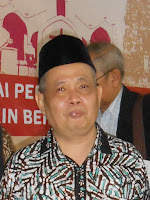 KH Imam Aziz, the chairman of cultural and inter-religious relations division of PBNU reminded us all to get back on personal piety embodied in our life, starting from the family. One’s piety will appear when there was a match between words and actions. The other important things according to him was purity, acknowledge the presence of others and contribution to society.
KH Imam Aziz, the chairman of cultural and inter-religious relations division of PBNU reminded us all to get back on personal piety embodied in our life, starting from the family. One’s piety will appear when there was a match between words and actions. The other important things according to him was purity, acknowledge the presence of others and contribution to society.
 In the reflective session with a theme on caring for nature through local wisdom to keep earth as house for all beings, the caregiver of Sanghyang Jati buddhist monastery, Bhante Dhamma Tejo Thera revealed that man had to go back to the Javanese proverb ‘Eling lan Waspada’ (be sensible and alert), that man is responsible for the preservation of the universe and all creations, if man cannot keep them, the nature will balance itself, and people called it as disaster. His experience when he first came to Gunung Selok in Cilacap, the place was barren. He initiated to plant thousands of mahogany and slowly but surely the place was re-greened and interesting to visit.
In the reflective session with a theme on caring for nature through local wisdom to keep earth as house for all beings, the caregiver of Sanghyang Jati buddhist monastery, Bhante Dhamma Tejo Thera revealed that man had to go back to the Javanese proverb ‘Eling lan Waspada’ (be sensible and alert), that man is responsible for the preservation of the universe and all creations, if man cannot keep them, the nature will balance itself, and people called it as disaster. His experience when he first came to Gunung Selok in Cilacap, the place was barren. He initiated to plant thousands of mahogany and slowly but surely the place was re-greened and interesting to visit.
 Muhammad Al-Fayyadl, a young activist who was born in Paiton in East Java conveyed Islam and ecology, reflected on the question of whether we have relationship with nature? How was our relationship with nature? This was interesting because we were all invited to reflect on between us and the nature, if the relation exploitative or interdependent. He also reminded the utilization of natural wealth of Indonesia should not bring disaster and impoverish society.
Muhammad Al-Fayyadl, a young activist who was born in Paiton in East Java conveyed Islam and ecology, reflected on the question of whether we have relationship with nature? How was our relationship with nature? This was interesting because we were all invited to reflect on between us and the nature, if the relation exploitative or interdependent. He also reminded the utilization of natural wealth of Indonesia should not bring disaster and impoverish society.
 At the end of the event, the participants visited spiritual pilgrimage tombs of Pandanaran, cave Maria Marganingsih and Prambanan temple as a form of togetherness and recognizing the interfaith relation. Indonesians, keeps your unity in diversity. (TRU)
At the end of the event, the participants visited spiritual pilgrimage tombs of Pandanaran, cave Maria Marganingsih and Prambanan temple as a form of togetherness and recognizing the interfaith relation. Indonesians, keeps your unity in diversity. (TRU)
by adminstube
These were the results of communication forum for interfaith teacher and lecturer of Yogyakarta. Each participant is challenged to be creative to find new methods for fostering tolerance and society’s solidarity. (YDA).
by adminstube
 With so many offers of temptations, youth often has problem how to fill their time well. Sport becomes one of healthy ways to do hobby and optimize their youth time positively. On Thursday, October 20, 2016, the participants of youth problem training held by Stube-HEMAT Yogyakarta met together to spend their time through sport. Mikha with 14 other friends from several campuses enthusiastically played futsal at MU Futsal, Kusumanegara, Yogyakarta.
With so many offers of temptations, youth often has problem how to fill their time well. Sport becomes one of healthy ways to do hobby and optimize their youth time positively. On Thursday, October 20, 2016, the participants of youth problem training held by Stube-HEMAT Yogyakarta met together to spend their time through sport. Mikha with 14 other friends from several campuses enthusiastically played futsal at MU Futsal, Kusumanegara, Yogyakarta.
After match, participants discussed about the continuity of the activity. Such sport will be more useful if it involves youth from various groups such as church youth, campus community and other youth groups. A match with other community will be held soon. By having regular exercise, youth will have healthier physic. We hope more and more young people will care of their physical health. (YDA)
by adminstube
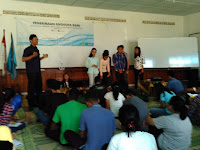 Then the participants were invited to reflect their dreams to revive and share goodness. A big change must be started from small self-changes. Furthermore, each participant determined one good thing they should be develop and one bad attitude to be eliminated.
Then the participants were invited to reflect their dreams to revive and share goodness. A big change must be started from small self-changes. Furthermore, each participant determined one good thing they should be develop and one bad attitude to be eliminated.by adminstube
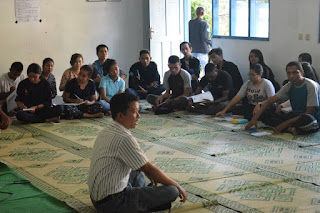 The explanation was followed by an overview of current situation of youth which is easy to complain. Pramoedya Ananta Toer, a famous writer, mentioned the Indonesian people fell in three things that enslave them. First, the Indonesian people were enslaved by fear. Second, they were enslaved by ignorance. Third, they were enslaved by disease. This situation might happen repeatedly if the current generation is easy to complain and could not find life meaning.
The explanation was followed by an overview of current situation of youth which is easy to complain. Pramoedya Ananta Toer, a famous writer, mentioned the Indonesian people fell in three things that enslave them. First, the Indonesian people were enslaved by fear. Second, they were enslaved by ignorance. Third, they were enslaved by disease. This situation might happen repeatedly if the current generation is easy to complain and could not find life meaning.
The session was ended by inviting each participants to write down what they would do and expect to happen in the next three years. (YDA).
by adminstube
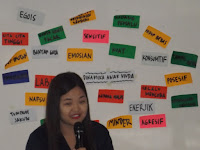 Based on many problems in the lives of young people, Stube-HEMAT Yogyakarta as a forum of learning for students studying in Yogyakarta, held a training on 'youth problem'.
Based on many problems in the lives of young people, Stube-HEMAT Yogyakarta as a forum of learning for students studying in Yogyakarta, held a training on 'youth problem'.
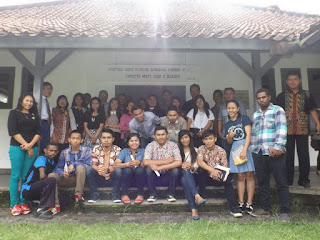 At the end of the training participants designed follow-up activity. They grouped themselves into seven groups which design certain activities, such as making documentary video about public opinion about free sex (Rudi’s group), delivering discussion and sharing among students at PMK ITY (Selvi & Tamjos’ group), futsal sport group to strengthen the relationship among students through positive activities Mika's group), sharing experiences to friends at boarding house and campus (Endang's group), creating a discussion and plant trees in STAK Marturia’s student dormitory (Ike & Titin's group), further discussion with friends at Sanata Dharma (Septi & Dodie's group), and writing articles on problem Youth (Agus & Umbu Wahi's group).
At the end of the training participants designed follow-up activity. They grouped themselves into seven groups which design certain activities, such as making documentary video about public opinion about free sex (Rudi’s group), delivering discussion and sharing among students at PMK ITY (Selvi & Tamjos’ group), futsal sport group to strengthen the relationship among students through positive activities Mika's group), sharing experiences to friends at boarding house and campus (Endang's group), creating a discussion and plant trees in STAK Marturia’s student dormitory (Ike & Titin's group), further discussion with friends at Sanata Dharma (Septi & Dodie's group), and writing articles on problem Youth (Agus & Umbu Wahi's group).
by adminstube
 For this reason the seminar on anti-terrorism batik and book review written by Aniek Handajani, S.Pd., M.Ed, was held. In the Harun Hadiwijono seminar hall of Duta Wacana Christian University, three keynote speakers such as, Prof. Ir. Sunarru Samsi Haryadi, M.Sc, Prof. Noorhaidi Hasan and Farsijana Adeney-Risakotta Ph.D, were invited. They explained about terrorism which is considered as serious threat to the integrity of national life.
For this reason the seminar on anti-terrorism batik and book review written by Aniek Handajani, S.Pd., M.Ed, was held. In the Harun Hadiwijono seminar hall of Duta Wacana Christian University, three keynote speakers such as, Prof. Ir. Sunarru Samsi Haryadi, M.Sc, Prof. Noorhaidi Hasan and Farsijana Adeney-Risakotta Ph.D, were invited. They explained about terrorism which is considered as serious threat to the integrity of national life.
We hope in the power of culture to combat terrorism will be embodied in a work, performance and production that support people's life. (YDA).
by adminstube
 "Indonesia is one country in the world that’s densely populated, reaching 255 million people. Youth group in the age range of 10-24 is reaching 25% of total population, or around 65 million people in number. Total population of adolescent is important for the existence of a state. Why? Because they will play a role in this country in the future, "said Trustha Rembaka, coordinator of Stube-HEMAT Yogyakarta in one discussion about Youth Problem which was held on Saturday, September 17, 2016 at the Secretariat of Stube-HEMAT Yogyakarta.
"Indonesia is one country in the world that’s densely populated, reaching 255 million people. Youth group in the age range of 10-24 is reaching 25% of total population, or around 65 million people in number. Total population of adolescent is important for the existence of a state. Why? Because they will play a role in this country in the future, "said Trustha Rembaka, coordinator of Stube-HEMAT Yogyakarta in one discussion about Youth Problem which was held on Saturday, September 17, 2016 at the Secretariat of Stube-HEMAT Yogyakarta.

 In the discussion, the participants were grouped into several small groups. They read newspapers and chose a news relating to a case occurring among youth. Then, each group shared the news and gave feedback. Some news chosen are including drug abuse, smoking and unhealthy lifestyle, theft, traffic violation, pornography and self-management. Furthermore, the participants conveyed social messages related to news through a creative design using drawing and coloring to attract attention to deliver messages.
In the discussion, the participants were grouped into several small groups. They read newspapers and chose a news relating to a case occurring among youth. Then, each group shared the news and gave feedback. Some news chosen are including drug abuse, smoking and unhealthy lifestyle, theft, traffic violation, pornography and self-management. Furthermore, the participants conveyed social messages related to news through a creative design using drawing and coloring to attract attention to deliver messages.
by adminstube
 In the beginning of the session, Trustha invited six students to draw up map fragments of Indonesia. Although they had difficulties, finally they were able to arrange the map fragments of Indonesia. Furthermore, they are reminded to be smart and be wise during living in Yogyakarta., such as, How to adapt to new environments which are different with their origin, to mingle with the society where they live, keep their focus on their goals to study in Yogyakarta and come to the realization that their knowledge should be beneficial for others and environment.
In the beginning of the session, Trustha invited six students to draw up map fragments of Indonesia. Although they had difficulties, finally they were able to arrange the map fragments of Indonesia. Furthermore, they are reminded to be smart and be wise during living in Yogyakarta., such as, How to adapt to new environments which are different with their origin, to mingle with the society where they live, keep their focus on their goals to study in Yogyakarta and come to the realization that their knowledge should be beneficial for others and environment.
 One of the participants, Puri, from Wonogiri, Central Java said that she would study seriously, because she realized that her opportunity to study in a college is a very valuable blessing. She was not able to continue her study if no one supported for her school fees.
One of the participants, Puri, from Wonogiri, Central Java said that she would study seriously, because she realized that her opportunity to study in a college is a very valuable blessing. She was not able to continue her study if no one supported for her school fees.
 At the end of the session, the facilitator invited participants and committee to sing a song ‘Tanah Airku’, as a call to dedicate their knowledge to the country. Some participants shed tears while singing the song.
At the end of the session, the facilitator invited participants and committee to sing a song ‘Tanah Airku’, as a call to dedicate their knowledge to the country. Some participants shed tears while singing the song.
Have a good time to study in Yogyakarta and dedicate your knowledge for our society, friends. (TRU).
by adminstube
These simple story of four young people hopefully will motivate readers. Business can be done by everyone, anytime, and anywhere. Young, age is not an inhibiting factor to thrive. Fill yourself with curiosity and spirit to develop, and the success will come. Warm regards of success to all young people. (ITM).
by adminstube
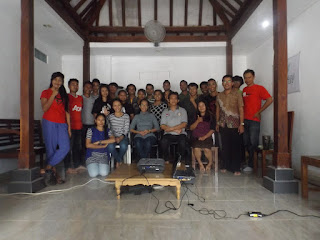 The program was started with a discussion delivered by Yohanes Andri Wardhana, a general manager of Sebangsa, a company engaged in development of community media, with a topic of gaming application and digital world business. Held on August 6, 2016 at the Secretariat of Stube-HEMAT, it discussed the evolution of the internet, social media user data, such as, Facebook, Line, Instagram and other social media in Indonesia besides business opportunity through gaming application and virtual world.
The program was started with a discussion delivered by Yohanes Andri Wardhana, a general manager of Sebangsa, a company engaged in development of community media, with a topic of gaming application and digital world business. Held on August 6, 2016 at the Secretariat of Stube-HEMAT, it discussed the evolution of the internet, social media user data, such as, Facebook, Line, Instagram and other social media in Indonesia besides business opportunity through gaming application and virtual world.by adminstube
 Started from renewable energy training (07/2016), which taught how to process organic waste into bio-briquette, she made her activity. On Sunday, July 30, 2016, a follow up group of bio-briquette was invited to share skills in making bio-briquette among the residents of Salam village at Patuk, Gunungkidul, Yogyakarta. Two students from Institute of Technology in Yogyakarta, namely Tamjos (faculty of energy) and Alvon (environmental engineering) were interested to fulfill the invitation and share their skills to them.
Started from renewable energy training (07/2016), which taught how to process organic waste into bio-briquette, she made her activity. On Sunday, July 30, 2016, a follow up group of bio-briquette was invited to share skills in making bio-briquette among the residents of Salam village at Patuk, Gunungkidul, Yogyakarta. Two students from Institute of Technology in Yogyakarta, namely Tamjos (faculty of energy) and Alvon (environmental engineering) were interested to fulfill the invitation and share their skills to them.
by adminstube
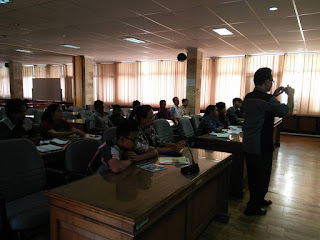 The planning to construct nuclear power plant in Jepara, Central Java triggered the pro and con among society. Generally people only hear the bad effects of nuclear, without receiving enough explanation from the competent sides in this field. Nuclear is not always bad. According to the explanation of DR Susilo, an expert in radiation security standard, nuclear is such a technology which is useful for society, for example, x-rays in medical. Nuclear radiation can shorten the period of some varieties of rice seed to yield their harvest quickly. Radiation can preserve canned food as food aid sent to disaster survivors such as in Bangladesh and other places. Simply, nuclear radiation is safe because the understanding is just like a fisherman laid fishes under the radiation of the sun to preserve salted fish.
The planning to construct nuclear power plant in Jepara, Central Java triggered the pro and con among society. Generally people only hear the bad effects of nuclear, without receiving enough explanation from the competent sides in this field. Nuclear is not always bad. According to the explanation of DR Susilo, an expert in radiation security standard, nuclear is such a technology which is useful for society, for example, x-rays in medical. Nuclear radiation can shorten the period of some varieties of rice seed to yield their harvest quickly. Radiation can preserve canned food as food aid sent to disaster survivors such as in Bangladesh and other places. Simply, nuclear radiation is safe because the understanding is just like a fisherman laid fishes under the radiation of the sun to preserve salted fish.
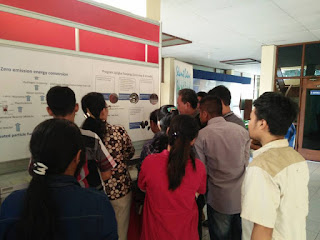 Observing a reactor called ‘Kartini’, behind the seminar room made all of us amazed. The security standard procedures were so tight as we were not allowed to take pictures inside the reactor chamber and we should wear lab coat and fabric footwear. The reactor is used just for a research and will be operated by order. A reactor is like a water reservoir using a principle of heating water through the chain fusion reaction of uranium and water vapor which drives turbines to produce electricity.
Observing a reactor called ‘Kartini’, behind the seminar room made all of us amazed. The security standard procedures were so tight as we were not allowed to take pictures inside the reactor chamber and we should wear lab coat and fabric footwear. The reactor is used just for a research and will be operated by order. A reactor is like a water reservoir using a principle of heating water through the chain fusion reaction of uranium and water vapor which drives turbines to produce electricity.
It is a valuable lesson to understand that nuclear is not always destructive. Let young people learn to prepare, start from the simple renewable energy. Further, state with a high electrification ratio indicates a developed countries. Are you ready to take part in our national development? (SRB).
by adminstube
 I saw through the plane window until I step my feet on land of Marapu for the first time. I felt, as far as my eyes can see, I have really been in Sumba. In the contrary, when I visited one region, I sometimes associated one region to another. However, Sumba island was a different paradise! Sumba has distinctive and unique characteristics that teased me to stay longer.
I saw through the plane window until I step my feet on land of Marapu for the first time. I felt, as far as my eyes can see, I have really been in Sumba. In the contrary, when I visited one region, I sometimes associated one region to another. However, Sumba island was a different paradise! Sumba has distinctive and unique characteristics that teased me to stay longer.
 My first interesting experience was my journey to Laimbonga village. During the trip I would not cease to gratitude in my heart how amazing God for the remarkable creation on Sumba. The natural condition of Sumba freshened my eyes with panorama of savanna prairie which seemed endless and accompanied by a herd of horses and cows enjoying their breakfast grass.
My first interesting experience was my journey to Laimbonga village. During the trip I would not cease to gratitude in my heart how amazing God for the remarkable creation on Sumba. The natural condition of Sumba freshened my eyes with panorama of savanna prairie which seemed endless and accompanied by a herd of horses and cows enjoying their breakfast grass.
 During the funeral procession, we did not miss the opportunity to record it. There were ritual prayers to escort the dead bodies to the grave yards which located in front of the house, accompanied by the sobs of women having family relationship. Uniquely, the wooden coffins and bonded with cement were reopened using a crowbar to retrieve bodies from each crate and put them in the grave, which had previously been covered with pieces of Sumbanese traditional woven fabric. I found that in some ways the practices were similar with the burial ceremony done in my origin, in Toraja, South Sulawesi, especially keeping the dead body for a long time.
During the funeral procession, we did not miss the opportunity to record it. There were ritual prayers to escort the dead bodies to the grave yards which located in front of the house, accompanied by the sobs of women having family relationship. Uniquely, the wooden coffins and bonded with cement were reopened using a crowbar to retrieve bodies from each crate and put them in the grave, which had previously been covered with pieces of Sumbanese traditional woven fabric. I found that in some ways the practices were similar with the burial ceremony done in my origin, in Toraja, South Sulawesi, especially keeping the dead body for a long time.
 My disconcerting experience was when I saw houses of Sumbanese, excactly called hut, because the size of their house was as big as my boarding room in Yogyakarta. I thought about such a small house, how many family members live in it? How can they free enough to live inside it? How is the bathing activity?
My disconcerting experience was when I saw houses of Sumbanese, excactly called hut, because the size of their house was as big as my boarding room in Yogyakarta. I thought about such a small house, how many family members live in it? How can they free enough to live inside it? How is the bathing activity?
by adminstube
 Exploring Sumba is a program from Stube-HEMAT Yogyakarta for students who want to know more about Sumba island and share information and knowledge with youth, students and local community. I was one of the participants of the program. I was so excited to join it because of the motivation from Elisabeth, my senior at Mercu Buana University of Yogyakarta. Formerly, she participated the program and then she was sent to Sumba. So, I was getting enthusiastic to participate and would like to have new experiences about eastern region of Indonesia and could interact with people there.
Exploring Sumba is a program from Stube-HEMAT Yogyakarta for students who want to know more about Sumba island and share information and knowledge with youth, students and local community. I was one of the participants of the program. I was so excited to join it because of the motivation from Elisabeth, my senior at Mercu Buana University of Yogyakarta. Formerly, she participated the program and then she was sent to Sumba. So, I was getting enthusiastic to participate and would like to have new experiences about eastern region of Indonesia and could interact with people there.
by adminstube
To all Stube HEMAT activists who were able to make bio-briquettes, let’s be a peer tutor and disseminate it to face the threat of energy crisis. Thank you Alvon Laoli. (SRB).
by adminstube
 Our concern about the future of energy has answered by a training on Renewable Energy with a theme "Utilizing Renewable Energy: What Can We Do?". Although the training occurred in a short time, from 17 – 19 June 2016 at Wisma Salam, Magelang, it proved to ignite participants’ curiosity and awareness toward energy issues.
Our concern about the future of energy has answered by a training on Renewable Energy with a theme "Utilizing Renewable Energy: What Can We Do?". Although the training occurred in a short time, from 17 – 19 June 2016 at Wisma Salam, Magelang, it proved to ignite participants’ curiosity and awareness toward energy issues.
 The first day, participants are invited to learn the importance of learning renewable energy. Executive Director of Stube-HEMAT, Ariani Narwastujati, S.Pd., S.S, M.Pd., provided an understanding of the basic concepts of global energy using mapping and electrification ratio. Renewable energy is the answer of equitable development, and the electricity needs in remote area could be supplied by renewable energy such as solar power, bio-gas, hydro power, wind and so on. In addition, beside the electrification ratio, the participants were introduced to a traditional energy source, such as briquettes, charcoals derived from organic wastes.
The first day, participants are invited to learn the importance of learning renewable energy. Executive Director of Stube-HEMAT, Ariani Narwastujati, S.Pd., S.S, M.Pd., provided an understanding of the basic concepts of global energy using mapping and electrification ratio. Renewable energy is the answer of equitable development, and the electricity needs in remote area could be supplied by renewable energy such as solar power, bio-gas, hydro power, wind and so on. In addition, beside the electrification ratio, the participants were introduced to a traditional energy source, such as briquettes, charcoals derived from organic wastes.
 In the second day, participants learned the history of the energy dependency of Indonesia presented by Silverio R.L. Aji Santoso, a History lecturer of Sanata Dharma University. "In fact, this topic has not been examined by Indonesian historia. Indonesia has been familiar with oil since the era of Sriwijaya. Indonesia was in a heyday as an oil-exporter country before 1969, when Suharto opened foreign investors. The greedy drilling of energy sources allegedly accelerate the depletion of oil and gas reserves of Indonesia," he said.
In the second day, participants learned the history of the energy dependency of Indonesia presented by Silverio R.L. Aji Santoso, a History lecturer of Sanata Dharma University. "In fact, this topic has not been examined by Indonesian historia. Indonesia has been familiar with oil since the era of Sriwijaya. Indonesia was in a heyday as an oil-exporter country before 1969, when Suharto opened foreign investors. The greedy drilling of energy sources allegedly accelerate the depletion of oil and gas reserves of Indonesia," he said.
 "The renewable energy is not solely the domain of engineering students," said Irawan, from the Center for Energy Studies, Gadjah Mada University. "During this time proved that ordinary people in rural area were able to optimize the potency of renewable energy in their region. All sciences must work together in the Micro-hydro Power Plant (MHPP)", he explained further. He added, "If you want to build a renewable energy power plant, you must know the real potency of the region, do not make a conclusion based on one-day visit. As an example, there is a student that had a vacation to a beach and he stated that the wind is potential to produce electricity, without concerning the wind continuity in the long term". The session became more interesting because participants learn various types of power plants, functions and how to maintain the installations.
"The renewable energy is not solely the domain of engineering students," said Irawan, from the Center for Energy Studies, Gadjah Mada University. "During this time proved that ordinary people in rural area were able to optimize the potency of renewable energy in their region. All sciences must work together in the Micro-hydro Power Plant (MHPP)", he explained further. He added, "If you want to build a renewable energy power plant, you must know the real potency of the region, do not make a conclusion based on one-day visit. As an example, there is a student that had a vacation to a beach and he stated that the wind is potential to produce electricity, without concerning the wind continuity in the long term". The session became more interesting because participants learn various types of power plants, functions and how to maintain the installations.
 The training continued by visiting locations which implement renewable energy, such as Sukunan village and Micro-hydro Power Plant at Minggir. At Sukunan participants learn how to build biogas installation and make briquettes. Harto, the facilitator in Sukunan explained that it needed joint commitment among the villagers in order to establish an energy in-dependency village. It is rather hard to build an energy independence village in Indonesia, because we feel as a rich country and be spoiled by the nature provision.
The training continued by visiting locations which implement renewable energy, such as Sukunan village and Micro-hydro Power Plant at Minggir. At Sukunan participants learn how to build biogas installation and make briquettes. Harto, the facilitator in Sukunan explained that it needed joint commitment among the villagers in order to establish an energy in-dependency village. It is rather hard to build an energy independence village in Indonesia, because we feel as a rich country and be spoiled by the nature provision.
 In MHPP Minggir participants were invited to understand the performance of equipment from Japan. MHPP utilizes water irrigation to propel turbines. "This simple thing can be done in our villages but the expensive equipment and maintenance cause problem", said Darno, a field staff of MHPP Minggir.
In MHPP Minggir participants were invited to understand the performance of equipment from Japan. MHPP utilizes water irrigation to propel turbines. "This simple thing can be done in our villages but the expensive equipment and maintenance cause problem", said Darno, a field staff of MHPP Minggir.
 Ricky Ryawan PL, is an activist of Stube-HEMAT Yogyakarta who had worked in Palu steam power plant for three years, added the participants’ horizon about the current problem occurred both inside and outside of power plant company. Good management will bring positive effect to the field. He emphasized, "We, as young people, should have a high work ethic and the ability as a 'problem solver,' because many unexpected problems may arise any time, such as facing residents around the company that sometimes it is not easy".
Ricky Ryawan PL, is an activist of Stube-HEMAT Yogyakarta who had worked in Palu steam power plant for three years, added the participants’ horizon about the current problem occurred both inside and outside of power plant company. Good management will bring positive effect to the field. He emphasized, "We, as young people, should have a high work ethic and the ability as a 'problem solver,' because many unexpected problems may arise any time, such as facing residents around the company that sometimes it is not easy".
 After following the Sunday sermon, a session of analyzing energy policy was conveyed by Ahmad Rahma Wardhana (PSE UGM). He opened participants’ mind to understand the policy of renewable energy, such as the national electricity company (PLN) will pay for the electricity produced by citizens. The price of renewable energy power will be higher than the conventional one, also the imported equipment will encumber the capital and maintenance cost. What young people can do is influencing policy to be more pro renewable energy.
After following the Sunday sermon, a session of analyzing energy policy was conveyed by Ahmad Rahma Wardhana (PSE UGM). He opened participants’ mind to understand the policy of renewable energy, such as the national electricity company (PLN) will pay for the electricity produced by citizens. The price of renewable energy power will be higher than the conventional one, also the imported equipment will encumber the capital and maintenance cost. What young people can do is influencing policy to be more pro renewable energy.
 The follow-up session challenged participants to think and do something related with energy. Some participants are encouraged to share their knowledge gained from the training, making briquettes and energy-saving campaign for people’s daily life.
The follow-up session challenged participants to think and do something related with energy. Some participants are encouraged to share their knowledge gained from the training, making briquettes and energy-saving campaign for people’s daily life.
by adminstube
 The seminar which was held on June 10, 2016, at Wisma Immanuel, Yogakarta was attended by the representatives of various churches and institutions in this province. The three main problems namely Terrorism, Radicalism and Drug were explained by competent speakers, such as Suhariyono, SIP (Head of Preventive of BNNP DIY – BNNP National Drugs Agency), Drs. Tri Susilo Harjoko (Kasubdit IV Police Intel-Police corp DIY), and Dr. Venny Pungud, Sp.KJ. (SMF Psychiatry and FK UKDW-Bethesda Hospital in Yogyakarta).
The seminar which was held on June 10, 2016, at Wisma Immanuel, Yogakarta was attended by the representatives of various churches and institutions in this province. The three main problems namely Terrorism, Radicalism and Drug were explained by competent speakers, such as Suhariyono, SIP (Head of Preventive of BNNP DIY – BNNP National Drugs Agency), Drs. Tri Susilo Harjoko (Kasubdit IV Police Intel-Police corp DIY), and Dr. Venny Pungud, Sp.KJ. (SMF Psychiatry and FK UKDW-Bethesda Hospital in Yogyakarta).by adminstube
 The next question is, why is Sumba, not to other island? Because there is a secretary of Stube-HEMAT in Sumba. They will go to Sumba as participants of Exploring program, a program to send students from Yogyakarta to Sumba for sharing knowledge and skills to students, young people and Sumbanese.
The next question is, why is Sumba, not to other island? Because there is a secretary of Stube-HEMAT in Sumba. They will go to Sumba as participants of Exploring program, a program to send students from Yogyakarta to Sumba for sharing knowledge and skills to students, young people and Sumbanese.
 Next, we will know the participants closer. First, Junita Samosir, a student coming from Simalungun, North Sumatra. Now, she has completed her study at faculty of Agro-technology, University of Mercu Buana Yogyakarta. She will share her knowledge about processing food that she had learned in campus. "I hope I can share my knowledge and it will be useful for the local community and I can also find many new experiences”,she said.
Next, we will know the participants closer. First, Junita Samosir, a student coming from Simalungun, North Sumatra. Now, she has completed her study at faculty of Agro-technology, University of Mercu Buana Yogyakarta. She will share her knowledge about processing food that she had learned in campus. "I hope I can share my knowledge and it will be useful for the local community and I can also find many new experiences”,she said.
 The second one is Resky Julius, a student from Toraja, South Sulawesi, a region having culture and tradition as quite tight as in Sumba. He is studying Management at Duta Wacana Christian University. During the exploring, he will interact and share experiences with students and church youth to prepare job application and Curriculum Vitae. Resky hopes, "I am getting to know about the indigenous people of Sumba, culture, craft, natural landscape and the people. In addition, I was also able to share the knowledge I have for the people in Sumba and I hope they can continue to spread it", he explained.
The second one is Resky Julius, a student from Toraja, South Sulawesi, a region having culture and tradition as quite tight as in Sumba. He is studying Management at Duta Wacana Christian University. During the exploring, he will interact and share experiences with students and church youth to prepare job application and Curriculum Vitae. Resky hopes, "I am getting to know about the indigenous people of Sumba, culture, craft, natural landscape and the people. In addition, I was also able to share the knowledge I have for the people in Sumba and I hope they can continue to spread it", he explained.
 The third participant is Christian Badai Bulin who is called Iyan. He is a student of Information Technology at Duta Wacana Christian University. He is from Pontianak, West Kalimantan. The knowledge and skills about computers and editing that he got from campus encourage him to share his experience with friends in Stube-HEMAT Sumba, especially making a short video containing messages of social, environmental awareness, and culture and tourism. In addition, Iyan also has a skill for singing, so he can practice singing with youth and students there.
The third participant is Christian Badai Bulin who is called Iyan. He is a student of Information Technology at Duta Wacana Christian University. He is from Pontianak, West Kalimantan. The knowledge and skills about computers and editing that he got from campus encourage him to share his experience with friends in Stube-HEMAT Sumba, especially making a short video containing messages of social, environmental awareness, and culture and tourism. In addition, Iyan also has a skill for singing, so he can practice singing with youth and students there.
 Rev. Dominggus Umbu Deta, S.Th., the coordinator of Stube-HEMAT Sumba hopes that all participants from Yogyakarta will be able to adapt with the situation in Sumba and to deliver materials well and it may be sustainability implemented. Finally, he welcome the participants to Marapu island and wishes they will have nice experiences! All team members of Stube HEMAT Sumba are ready to work together for progress. (TRU).
Rev. Dominggus Umbu Deta, S.Th., the coordinator of Stube-HEMAT Sumba hopes that all participants from Yogyakarta will be able to adapt with the situation in Sumba and to deliver materials well and it may be sustainability implemented. Finally, he welcome the participants to Marapu island and wishes they will have nice experiences! All team members of Stube HEMAT Sumba are ready to work together for progress. (TRU).
by adminstube
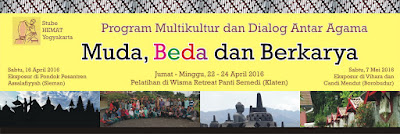 A training on Multicultural, and Inter-religious Dialogue organized by Stube-HEMAT Yogyakarta at Wisma Panti Semedi, Klaten on Friday to Sunday, April 22-24, 2016 encouraged the participants to do follow-up action in social reality. Some participants, mostly students of STPMD "APMD" responded positively to this by establishing a cooperation in diverse society by ethnics, religions and cultures. They initiated a community called Student Community for Environmental Concern. Their real action is shown in cooperation with KOMPAG, Youth Community of Gendeng (a local youth community) and residents of RW 20 Gendeng, manifested in social service, by cleaning the surrounding area.
A training on Multicultural, and Inter-religious Dialogue organized by Stube-HEMAT Yogyakarta at Wisma Panti Semedi, Klaten on Friday to Sunday, April 22-24, 2016 encouraged the participants to do follow-up action in social reality. Some participants, mostly students of STPMD "APMD" responded positively to this by establishing a cooperation in diverse society by ethnics, religions and cultures. They initiated a community called Student Community for Environmental Concern. Their real action is shown in cooperation with KOMPAG, Youth Community of Gendeng (a local youth community) and residents of RW 20 Gendeng, manifested in social service, by cleaning the surrounding area.
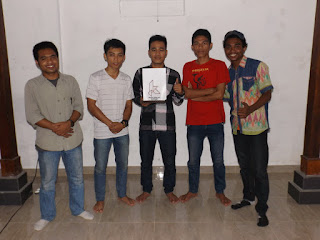 Following the event, Youth Community of Gendeng and village officials invited this community to attend the 13th anniversary of the Youth Community of Gendeng (KOMPAG) on Sunday, May 15, 2016. In that occasion, the local officer gave positive response to the group that has worked together with local residents and he also asked them to stay away from drugs and not to be curious about it. Next, the chairman of RW Gendeng thanked this student community and hoped that the cooperation will continue in the future. There are also some awards in several categories: youth creativity category was achieved by Youth Community of Gendeng, smart kids category was achieved by children of Gendeng village, and critical and initiative category was awarded to Student Community for Environmental Concern for their initiative and participation in activity with Gendeng community.
Following the event, Youth Community of Gendeng and village officials invited this community to attend the 13th anniversary of the Youth Community of Gendeng (KOMPAG) on Sunday, May 15, 2016. In that occasion, the local officer gave positive response to the group that has worked together with local residents and he also asked them to stay away from drugs and not to be curious about it. Next, the chairman of RW Gendeng thanked this student community and hoped that the cooperation will continue in the future. There are also some awards in several categories: youth creativity category was achieved by Youth Community of Gendeng, smart kids category was achieved by children of Gendeng village, and critical and initiative category was awarded to Student Community for Environmental Concern for their initiative and participation in activity with Gendeng community.
by adminstube
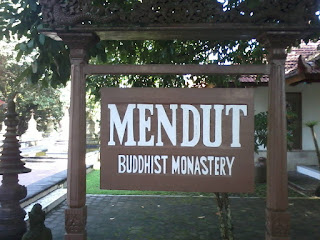 On Saturday, May 7, 2016, two dozens of students held a study tour or an exposure to a Buddhist Monastery at Mendut. The activity is a series of Multiculturalism and Inter-religious Dialogue Program organized by Stube-HEMAT Yogyakarta. Mendut Monastery is one of the Buddhist building located in Mendut village, Magelang, Central Java. The situation of Monastery complex was very beautiful and well-maintained. It is surrounded by trees and parks with various ornaments of Buddha statues. The participants were fascinated and felt a contemplative situation when they entered the monastery.
On Saturday, May 7, 2016, two dozens of students held a study tour or an exposure to a Buddhist Monastery at Mendut. The activity is a series of Multiculturalism and Inter-religious Dialogue Program organized by Stube-HEMAT Yogyakarta. Mendut Monastery is one of the Buddhist building located in Mendut village, Magelang, Central Java. The situation of Monastery complex was very beautiful and well-maintained. It is surrounded by trees and parks with various ornaments of Buddha statues. The participants were fascinated and felt a contemplative situation when they entered the monastery.
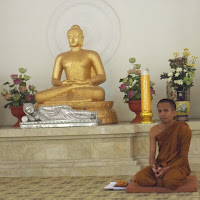 Yohanes was the moderator of the discussion during exposure and Bhikkhu Atthapiyo, a Budhist Bhikkhu who warmly welcomed the group and facilitated the exposure. He was very enthusiastic and he appreciated the presence of the students as the future’s generations to learn further the diversity in Indonesia.
Yohanes was the moderator of the discussion during exposure and Bhikkhu Atthapiyo, a Budhist Bhikkhu who warmly welcomed the group and facilitated the exposure. He was very enthusiastic and he appreciated the presence of the students as the future’s generations to learn further the diversity in Indonesia.
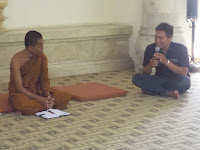 Trustha Rembaka, S. Th., the coordinator of Stube- HEMAT Yogyakarta expressed thankfulness to Bhikkhu Atthapiyo and Mendut monastery, for the chance given to Stube and students to have dialogue and learn Buddhist and the relation among multicultural society.
Trustha Rembaka, S. Th., the coordinator of Stube- HEMAT Yogyakarta expressed thankfulness to Bhikkhu Atthapiyo and Mendut monastery, for the chance given to Stube and students to have dialogue and learn Buddhist and the relation among multicultural society.
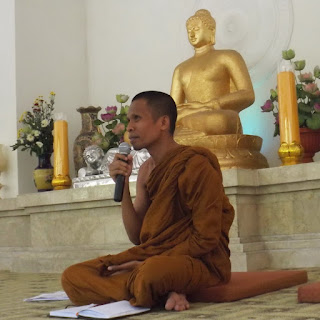 Bhikkhu Atthapiyo introduced himself and said that he was the first Bhikkhu from Flores, Eastern Indonesia. Buddhists were living under the Sangha Theravada Indonesia (STI) association. Mendut monastery was built in 1970 by Bhikkhu Pannavaro. Although Buddhist people do not live around the monastery, the monastery gives many advantages for people living around it as they work in monastery and trade around the monastery.
Bhikkhu Atthapiyo introduced himself and said that he was the first Bhikkhu from Flores, Eastern Indonesia. Buddhists were living under the Sangha Theravada Indonesia (STI) association. Mendut monastery was built in 1970 by Bhikkhu Pannavaro. Although Buddhist people do not live around the monastery, the monastery gives many advantages for people living around it as they work in monastery and trade around the monastery.
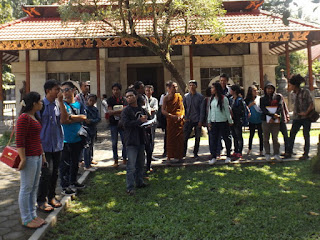 After the dialogue, Bhikkhu Atthapiyo guided all of them to walk around the monastery. The students learned the philosophy of water pool and lotus. Even though lotus grows in muddy water, they are still able to grow and give beautiful flower. The beauty and uniqueness of Buddha statues decorated the yard of the monastery. They were curved based on their origin, such as India, Thailand and Myanmar. Bodhi’s tree (ficus religiosa L), Sala’s tree (shorea robusta) which is also called Cannon Ball Tree, some stupas, a monument of Ashoka, and a very huge bell can be found in the front of meditation’s room.
After the dialogue, Bhikkhu Atthapiyo guided all of them to walk around the monastery. The students learned the philosophy of water pool and lotus. Even though lotus grows in muddy water, they are still able to grow and give beautiful flower. The beauty and uniqueness of Buddha statues decorated the yard of the monastery. They were curved based on their origin, such as India, Thailand and Myanmar. Bodhi’s tree (ficus religiosa L), Sala’s tree (shorea robusta) which is also called Cannon Ball Tree, some stupas, a monument of Ashoka, and a very huge bell can be found in the front of meditation’s room.
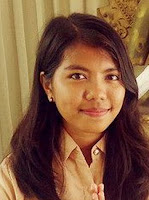 “It’s my new experience to join an exposure to Vihara, especially with a topic about self-reconciliation before having reconciliation with others, and also interact with other people,” said Grace, one of the participants.
“It’s my new experience to join an exposure to Vihara, especially with a topic about self-reconciliation before having reconciliation with others, and also interact with other people,” said Grace, one of the participants.
by adminstube
 The training encouraged participants to establish networking with various groups with different backgrounds, trained them to find solutions of disharmony between ethnic groups and religions, empowered them to be able to disseminate understanding, not just tolerance but cooperation for humanity, also motivated them to develop themselves to make joint dialogue among religions in society and actively deal with the conflicts that arise.
The training encouraged participants to establish networking with various groups with different backgrounds, trained them to find solutions of disharmony between ethnic groups and religions, empowered them to be able to disseminate understanding, not just tolerance but cooperation for humanity, also motivated them to develop themselves to make joint dialogue among religions in society and actively deal with the conflicts that arise.
 The sessions of this training include Multiculture Introduction, Dialogue with Forum for Religious Unity in Klaten, Mapping Potency of Conflicts in Indonesia, Group Discussion for each region and Designing Follow-up activities as a form of acquiring new knowledge. Speakers involved in this training, besides the internal team of Stube-HEMAT are Gus Jazuli ofIslamic boarding school of Saleh Akrom Nusantara (PeSAN), a religious leaders of various religions and beliefs Forum in Klaten, Pdt. Izak M.Y Lattu. Ph.D., a lecturer of Satya Wacana Christian University and Pdt. Krisapndaru, S.Th, a priest of Javanese Christian Church of Pedan.
The sessions of this training include Multiculture Introduction, Dialogue with Forum for Religious Unity in Klaten, Mapping Potency of Conflicts in Indonesia, Group Discussion for each region and Designing Follow-up activities as a form of acquiring new knowledge. Speakers involved in this training, besides the internal team of Stube-HEMAT are Gus Jazuli ofIslamic boarding school of Saleh Akrom Nusantara (PeSAN), a religious leaders of various religions and beliefs Forum in Klaten, Pdt. Izak M.Y Lattu. Ph.D., a lecturer of Satya Wacana Christian University and Pdt. Krisapndaru, S.Th, a priest of Javanese Christian Church of Pedan.
 “The presence of religious leaders and faith from FKUB Kebersamaan Klaten was very impress and inspire me to arrange such a meeting for interfaith leaders in my home, because I think it gives harmony atmosphere among pluralistic society," said Carly, an APMD student from Manggarai, NTT. Solidarity of various religions and beliefs Forum in Klaten was strongly felt by the participants because the presence of the various religious leaders in this training session.
“The presence of religious leaders and faith from FKUB Kebersamaan Klaten was very impress and inspire me to arrange such a meeting for interfaith leaders in my home, because I think it gives harmony atmosphere among pluralistic society," said Carly, an APMD student from Manggarai, NTT. Solidarity of various religions and beliefs Forum in Klaten was strongly felt by the participants because the presence of the various religious leaders in this training session.
 "The power of local wisdom which is already exist in every ethnic in Indonesia is needed to be learned and bequeath from generation to generation, so they do not lose the noble values of their ancestors. They may also consider that differences is not a threat that must be eliminated. Riots between ethnic and religion should not happen anymore like in Ambon if the people really understand the value of Pela Gandong as well as knowing how the pillars of a mosque became church’s pillar. The wisdom is needed to be told continually," said Rev. Izzak Y.M. Lattu, Ph.D in his session.
"The power of local wisdom which is already exist in every ethnic in Indonesia is needed to be learned and bequeath from generation to generation, so they do not lose the noble values of their ancestors. They may also consider that differences is not a threat that must be eliminated. Riots between ethnic and religion should not happen anymore like in Ambon if the people really understand the value of Pela Gandong as well as knowing how the pillars of a mosque became church’s pillar. The wisdom is needed to be told continually," said Rev. Izzak Y.M. Lattu, Ph.D in his session.
 At the end of the session, participants were asked to formulate activity as a form of new understanding they get during training. The dissemination of multicultural understanding through discussion, writing and real work in community become alternative activities for them to do.
At the end of the session, participants were asked to formulate activity as a form of new understanding they get during training. The dissemination of multicultural understanding through discussion, writing and real work in community become alternative activities for them to do.
 On the way home from Klaten to Yogyakarta, participants were given an opportunity to visit Plaosan, a temple built in 9th century A.D. The temple is a fusion of Hindu and Buddha created by a mixed marriage between Rakai Pikatan who built Prambanan which has Hindu background and Princess Pramodhawardani of the Sailendra’s dynasty which has Buddhism background. In this temple participants learned that the acceptance of diversity has been going on since the past time.
On the way home from Klaten to Yogyakarta, participants were given an opportunity to visit Plaosan, a temple built in 9th century A.D. The temple is a fusion of Hindu and Buddha created by a mixed marriage between Rakai Pikatan who built Prambanan which has Hindu background and Princess Pramodhawardani of the Sailendra’s dynasty which has Buddhism background. In this temple participants learned that the acceptance of diversity has been going on since the past time.
by adminstube
- Mapping potencies and challenges in their origin.
- Sharing the knowledge and the experience learned during study in Yogyakarta
- open networks and work orientation in their origin.
- active participant of Stube-HEMAT Yogyakarta
- Propose application and presentation
- Attend debriefing meeting
- Statement of Commitment
- Available for 3 participants in 2016
- The implementation period from March to November
by adminstube
 This visit was the agenda of a training on Multicultural, and Inter-religious Dialogue. The participants were encouraged to show their identity amid diversity and be flexible in their interaction with other communities. However, interaction and dialogue is undeniable fact in this country in order to develop unity in diversity. We need to interact and dialogue with others. So, Stube-HEMAT Yogyakarta arranged a meeting with religious and cultural communities in the province.
This visit was the agenda of a training on Multicultural, and Inter-religious Dialogue. The participants were encouraged to show their identity amid diversity and be flexible in their interaction with other communities. However, interaction and dialogue is undeniable fact in this country in order to develop unity in diversity. We need to interact and dialogue with others. So, Stube-HEMAT Yogyakarta arranged a meeting with religious and cultural communities in the province.
 "Here, at Assalafiyah, pondok pesantren also gives regular school," said Gus Irwan in the beginning of the dialogue. Gus Irwan explained that the santris (students dwelling in Pondok Pesantren) here mostly study in nearby campuses like UTY, UIN, Gadjah Mada University and Indonesian Islamic University (UII). The santris have similarity with regular students. The difference is they should stay at pondok pesantren so they have more time to pray every day. While regular students is praying at their boarding house.
"Here, at Assalafiyah, pondok pesantren also gives regular school," said Gus Irwan in the beginning of the dialogue. Gus Irwan explained that the santris (students dwelling in Pondok Pesantren) here mostly study in nearby campuses like UTY, UIN, Gadjah Mada University and Indonesian Islamic University (UII). The santris have similarity with regular students. The difference is they should stay at pondok pesantren so they have more time to pray every day. While regular students is praying at their boarding house.
by adminstube
 World of writing is not merely world of ‘workman’, who does something repeatedly. It is a world of ideas instead. The idea would be formed paralleled with empiric mindset, conceptual dimension, reducing phenomenon and sharpen analysis.
World of writing is not merely world of ‘workman’, who does something repeatedly. It is a world of ideas instead. The idea would be formed paralleled with empiric mindset, conceptual dimension, reducing phenomenon and sharpen analysis.
 Rendi Panuju’s book published by UGM press in 1994 became the topic of the discussion among Stube-HEMAT Yogyakarta students. Held on Friday, April 8, 2016 at Stube HEMAT secretariat, the discussion ran well. Rudy chose it because its content and benefit he got from the book and it can be found through his experience of writing in mass media. His experiences made the discussion more interesting. Participants were encouraged to know more about writing.
Rendi Panuju’s book published by UGM press in 1994 became the topic of the discussion among Stube-HEMAT Yogyakarta students. Held on Friday, April 8, 2016 at Stube HEMAT secretariat, the discussion ran well. Rudy chose it because its content and benefit he got from the book and it can be found through his experience of writing in mass media. His experiences made the discussion more interesting. Participants were encouraged to know more about writing.
 Rudy also revealed many tips, so a writing can be published in mass media. The point is, right writing to the right media. Technically, we must consider the title carefully. Rudy also explained that the article should have facts or data, not just opinion. For student, he/she should mention his/her campus, or describes himself/herself as a student of a university.
Rudy also revealed many tips, so a writing can be published in mass media. The point is, right writing to the right media. Technically, we must consider the title carefully. Rudy also explained that the article should have facts or data, not just opinion. For student, he/she should mention his/her campus, or describes himself/herself as a student of a university.
This book review gave new knowledge in writing, insight into world of writing and equiped students for the future as the writing skills empower student to write thesis. Be sure that everyone can write and please remember that if you want to know the world, you should read a lot and if you want to be well known by the world, you should write. Good luck! (ITM).
by adminstube
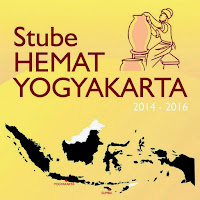 A topic on social justice discussing ‘Drought in Jogja’ became a hot topic among participants who have ever attended Stube-HEMAT training on Christianity and Social Justice. This group was called Enviro 16, consisting of 6 students from Institut Teknologi Yogyakarta (ITY): Timotius, Olive, Cindy, Lili, Martina and Mendo, plus Agus, Eman and Peter, also the representatives of Stube-HEMAT, Yohanes and Stenly.
A topic on social justice discussing ‘Drought in Jogja’ became a hot topic among participants who have ever attended Stube-HEMAT training on Christianity and Social Justice. This group was called Enviro 16, consisting of 6 students from Institut Teknologi Yogyakarta (ITY): Timotius, Olive, Cindy, Lili, Martina and Mendo, plus Agus, Eman and Peter, also the representatives of Stube-HEMAT, Yohanes and Stenly.
This group wishes that more and more friends who are aware of the environment changing, be wiser in managing it and eager to share understanding of love to environment to many people, so they become aware that the environment is important to be maintained. Keeping environment means maintaining righteous life. (YDA).
by adminstube
 The comics were used as teaching materials for small children in Sunday school of 5-8 years at Javanese Christian Church of Ambarukmo, Pepanthan Nologaten, on Monday, March 13, 2016, with the theme "Pay at any price" (Yoh.12: 1-8). The figures taken from the Bible was Judas, who kept injustice since in his mind. Judas abused his position as treasurer of the community of Jesus' followers. The feeling of envy grabbed him when Mary Magdalene anointed Jesus' feet with narwastu oil, cost 300 dinars, or about $ 10,000. He denounced it as a wasting thing, he launched criticism as if he was caring orphans. Mary did it as her expression of gratitude for the miracles onto Lazarus, which arised from his dead. She thought that his life is more precious than money.
The comics were used as teaching materials for small children in Sunday school of 5-8 years at Javanese Christian Church of Ambarukmo, Pepanthan Nologaten, on Monday, March 13, 2016, with the theme "Pay at any price" (Yoh.12: 1-8). The figures taken from the Bible was Judas, who kept injustice since in his mind. Judas abused his position as treasurer of the community of Jesus' followers. The feeling of envy grabbed him when Mary Magdalene anointed Jesus' feet with narwastu oil, cost 300 dinars, or about $ 10,000. He denounced it as a wasting thing, he launched criticism as if he was caring orphans. Mary did it as her expression of gratitude for the miracles onto Lazarus, which arised from his dead. She thought that his life is more precious than money.

 Domi said, "Those children are enthusiastic to draw, they are motivated to master the material as illustrated in pictures. Even simple, I believe this experience will stay imprinted in their hearts, so injustice in their mind will be gradually vanished." Jerry looked so proud because the children appreciated his work. He is now working a Bible comic using Sumba language because of his longing to share experiences to children in his hometown. The comic tells about justice done by figures in the bible.
Domi said, "Those children are enthusiastic to draw, they are motivated to master the material as illustrated in pictures. Even simple, I believe this experience will stay imprinted in their hearts, so injustice in their mind will be gradually vanished." Jerry looked so proud because the children appreciated his work. He is now working a Bible comic using Sumba language because of his longing to share experiences to children in his hometown. The comic tells about justice done by figures in the bible.
Keep working, guys! Those children look forward other figures that will be drawn next week. Hopefully, this collective memory guide ‘children’ practicing the fifth principle of Pancasila 'social justice for all Indonesians.’ (SRB).
by adminstube
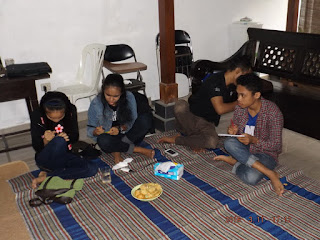 This book review time was opened by Yohanes as the host and continued by Sarloce as the moderator. It began with playing games in which participants wrote seven types of vegetables which are easily planted on narrow grounds. Some participants were able to write up to seven types of vegetables but some others were not.
This book review time was opened by Yohanes as the host and continued by Sarloce as the moderator. It began with playing games in which participants wrote seven types of vegetables which are easily planted on narrow grounds. Some participants were able to write up to seven types of vegetables but some others were not.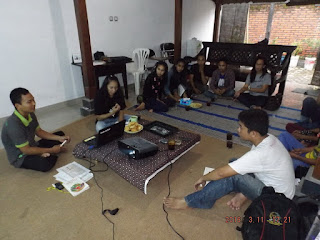 The discussion is interesting because some participants have already attended the session before. Nine participants and five member team of Stube-HEMAT Yogyakarta were able to enliven the discussion. Pascah began the session by explaining the author, publisher, number of pages, reason why he chose the book.
The discussion is interesting because some participants have already attended the session before. Nine participants and five member team of Stube-HEMAT Yogyakarta were able to enliven the discussion. Pascah began the session by explaining the author, publisher, number of pages, reason why he chose the book.
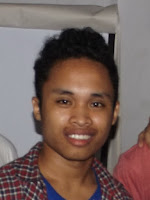
 Discussions getting ‘catchy’ when question and answer session came. Jerry asked what the difference between planting in sand and plain soil was. While Nuel wanted to know the simple way how to measure the acidity of soil or soil pH. Tasya asked about the type of vegetables having high nutrition.
Discussions getting ‘catchy’ when question and answer session came. Jerry asked what the difference between planting in sand and plain soil was. While Nuel wanted to know the simple way how to measure the acidity of soil or soil pH. Tasya asked about the type of vegetables having high nutrition.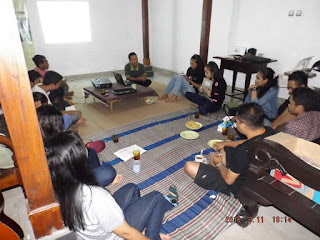 This book review gave a lot of understanding and perspectives toward agriculture. One alternative planting to optimize small area is hydroponics, but the simplest way of planting is using small bags by recycling plastic bottle as pot. Good luck to plant in your narrow garden. (SAP).
This book review gave a lot of understanding and perspectives toward agriculture. One alternative planting to optimize small area is hydroponics, but the simplest way of planting is using small bags by recycling plastic bottle as pot. Good luck to plant in your narrow garden. (SAP).by adminstube
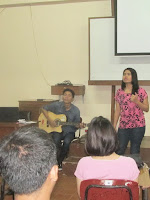 On Monday, March 7, 2016 several students from several universities in Yogyakarta, including STPMD 'APMD', UMBY, STAK Marturia, LPP, UST held a discussion with ‘Talenta’ fellowship, a Christian student community of Mercu Buana University, Yogyakarta. The discussion held as part of regular fellowship was facilitated by Chobas, a student of STPMD 'APMD.' He shared a topic of ‘Justice, from political, social, and religion aspects: What Christian Youth Can Do?’
On Monday, March 7, 2016 several students from several universities in Yogyakarta, including STPMD 'APMD', UMBY, STAK Marturia, LPP, UST held a discussion with ‘Talenta’ fellowship, a Christian student community of Mercu Buana University, Yogyakarta. The discussion held as part of regular fellowship was facilitated by Chobas, a student of STPMD 'APMD.' He shared a topic of ‘Justice, from political, social, and religion aspects: What Christian Youth Can Do?’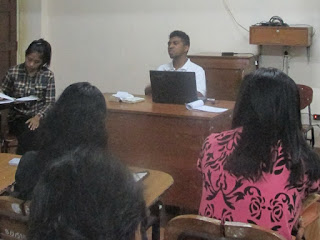 Chobas conveyed Aristotle's theory of justice: commutative justice, distributive justice, natural justice, conventional justice, and justice improvement. He gave many examples for justice with political and social approach, so it was easy for the listener to understand. While verses taken from John 5: 30-31 says: "I can do nothing of myself; I judge according to what I hear, and my judgment is fair, because I did not follow my own free will, but the will of him who sent me. If I testify about myself, my testimony was not true', became a conclusion of justice with religious approach.
Chobas conveyed Aristotle's theory of justice: commutative justice, distributive justice, natural justice, conventional justice, and justice improvement. He gave many examples for justice with political and social approach, so it was easy for the listener to understand. While verses taken from John 5: 30-31 says: "I can do nothing of myself; I judge according to what I hear, and my judgment is fair, because I did not follow my own free will, but the will of him who sent me. If I testify about myself, my testimony was not true', became a conclusion of justice with religious approach. Veni, a student of Agro-technology faculty of Mercu Buana asked, "What one must do, if he/she does not know politics, moreover to fight against injustice?" Chobas responded by explaining that politics is universal, everyone has right to take part in politics. However, politics has levels, for example, Ahok and Ahmad Dhani (two figures currently competing for governor in Jakarta). One should learn and go under process to have political capability before entering political world.
Veni, a student of Agro-technology faculty of Mercu Buana asked, "What one must do, if he/she does not know politics, moreover to fight against injustice?" Chobas responded by explaining that politics is universal, everyone has right to take part in politics. However, politics has levels, for example, Ahok and Ahmad Dhani (two figures currently competing for governor in Jakarta). One should learn and go under process to have political capability before entering political world.by adminstube
 Stube-HEMAT Yogyakarta as an institution to serve students studying in Yogyakarta encouraged the growth of reading and writing habit among students through a forum, namely All about Books and Publishing, presenting Triasmana Wirasta, an editor and practitioners of publication. He was also an alumnus of Stube-HEMAT Yogyakarta. Rasta, commonly called, who has been long working in publishing, provided an overview of the ins and outs of writing and publishing, so that students are motivated and learn to improve their quality of writing even able to publish a book.
Stube-HEMAT Yogyakarta as an institution to serve students studying in Yogyakarta encouraged the growth of reading and writing habit among students through a forum, namely All about Books and Publishing, presenting Triasmana Wirasta, an editor and practitioners of publication. He was also an alumnus of Stube-HEMAT Yogyakarta. Rasta, commonly called, who has been long working in publishing, provided an overview of the ins and outs of writing and publishing, so that students are motivated and learn to improve their quality of writing even able to publish a book.
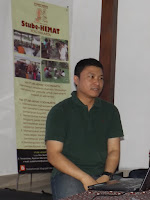 Triasmana Wirasta working at Skripta Media Creative publisher told the ins and outs process of publishing in Indonesia. In Indonesia, the number of publisher reached 1,328 publishers, but in fact the number of publications in Indonesia was very low, according to the data from the National Library, the number of ISBN in 2014 reached 44.327. It meant that the number of publications in Indonesia was still lower than other countries, such as Japan which publish 82.589 and India 90.000 titles in 2013.
Triasmana Wirasta working at Skripta Media Creative publisher told the ins and outs process of publishing in Indonesia. In Indonesia, the number of publisher reached 1,328 publishers, but in fact the number of publications in Indonesia was very low, according to the data from the National Library, the number of ISBN in 2014 reached 44.327. It meant that the number of publications in Indonesia was still lower than other countries, such as Japan which publish 82.589 and India 90.000 titles in 2013.
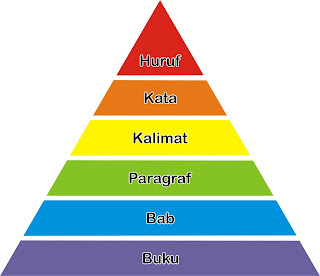 Rasta mentioned criticism of Taufik Ismail, that the current generation was 'myopic in reading and paralyzed in writing.’ He explained that reading interest is still low because the culture of reading has not been realized yet among the community. In addition, it was also influenced by a lack of qualified reading text. While the low of interest in writing was influenced by the writing culture, low knowledge on procedure of writing and publishing and wrong assumption about the world of writing and publishing. Actually, the author reputation is worth only 10% (comparison in the table), it means that, the beginners get opportunity to publish a book! Note: (grading standard in publishing: editorial 10%, prospect of market 50%, content 30%, reputation of the author 10%).
Rasta mentioned criticism of Taufik Ismail, that the current generation was 'myopic in reading and paralyzed in writing.’ He explained that reading interest is still low because the culture of reading has not been realized yet among the community. In addition, it was also influenced by a lack of qualified reading text. While the low of interest in writing was influenced by the writing culture, low knowledge on procedure of writing and publishing and wrong assumption about the world of writing and publishing. Actually, the author reputation is worth only 10% (comparison in the table), it means that, the beginners get opportunity to publish a book! Note: (grading standard in publishing: editorial 10%, prospect of market 50%, content 30%, reputation of the author 10%).
by adminstube
by adminstube

 Two facilitators who experienced in works and struggles against injustice were invited to this training in order to equip participants with new insight, knowledge and networks. They were Rev. Paulus Hartono, M. Min (MCC - GKMI) who shared practical experiences of GKMI how to struggle against injustice through cultural ways and Haryati Pancaputri, SH, the director of YAPHI Surakarta, that shared experiences of LPH YAPHI fight for justice through legal affairs.
Two facilitators who experienced in works and struggles against injustice were invited to this training in order to equip participants with new insight, knowledge and networks. They were Rev. Paulus Hartono, M. Min (MCC - GKMI) who shared practical experiences of GKMI how to struggle against injustice through cultural ways and Haryati Pancaputri, SH, the director of YAPHI Surakarta, that shared experiences of LPH YAPHI fight for justice through legal affairs.
 Based on the goals of the training, Yohanes Dian Alpasa, the field coordinator of the training said, "Participants were able to retell the content they have got. It can be seen from the dynamics of the groups and their presentations. It means that they have achieved the cognitive level as one of the training indicators".
Based on the goals of the training, Yohanes Dian Alpasa, the field coordinator of the training said, "Participants were able to retell the content they have got. It can be seen from the dynamics of the groups and their presentations. It means that they have achieved the cognitive level as one of the training indicators".
by adminstube
- Reymond Michael M (a researcher on Anthropology, University of Indonesia),
- Adi Christianto (Forum of Farmers and Manufacturers of Fermented Beverages),
- Agus Wahyudi (Institute of Justice),
- Priyambodo (UPKM/Community Development (CD) Bethesda).
 Agus Wahyudi explained if alcoholic beverage distribution is prohibited in Indonesia, black market will happen and be more dangerous because the materials used are illegal and risky for the consumers. While Priyambodo added, the materials used in traditional alcoholic beverages manufacture were natural products, such as noni and palm trees. Manufacturers did not use hazardous substances. So far there was no report that drinking ‘tuak’ (name of traditional alcoholic beverage) causes death, but so far, drinking 'oplosan' (mixed beverages) causes death. The incident above gave impact to farmers who produce traditional beverages, as it is the way they earn for daily needs.
Agus Wahyudi explained if alcoholic beverage distribution is prohibited in Indonesia, black market will happen and be more dangerous because the materials used are illegal and risky for the consumers. While Priyambodo added, the materials used in traditional alcoholic beverages manufacture were natural products, such as noni and palm trees. Manufacturers did not use hazardous substances. So far there was no report that drinking ‘tuak’ (name of traditional alcoholic beverage) causes death, but so far, drinking 'oplosan' (mixed beverages) causes death. The incident above gave impact to farmers who produce traditional beverages, as it is the way they earn for daily needs.
by adminstube
 Lenna, a student from West Kalimantan, invited participants to stand and sing a song ‘Tetap Setia’ (be faithful) and then continued with introduction. The students of Janabadra University were very plural because they came from many different regions, such as Papua, Kalimantan, Sumatera, Sulawesi, Maluku and Nusa Tenggara.
Lenna, a student from West Kalimantan, invited participants to stand and sing a song ‘Tetap Setia’ (be faithful) and then continued with introduction. The students of Janabadra University were very plural because they came from many different regions, such as Papua, Kalimantan, Sumatera, Sulawesi, Maluku and Nusa Tenggara.
 "Stube-HEMAT Yogyakarta as an institution giving coaching and student-oriented development for students from various places in Indonesia who are studying in Yogyakarta, could be an option for you to have activities. Some students of Janabadra University were also activist of Stube-HEMAT Yogyakarta and got opportunity to develop themselves and got opportunity to know other areas. They were Sofia who has researched mountain salt in Krayan, North Borneo and Herga from Dobo, Southeast Maluku who was sent to Sumba to socialize the importance of having personal identity, "said Trustha.
"Stube-HEMAT Yogyakarta as an institution giving coaching and student-oriented development for students from various places in Indonesia who are studying in Yogyakarta, could be an option for you to have activities. Some students of Janabadra University were also activist of Stube-HEMAT Yogyakarta and got opportunity to develop themselves and got opportunity to know other areas. They were Sofia who has researched mountain salt in Krayan, North Borneo and Herga from Dobo, Southeast Maluku who was sent to Sumba to socialize the importance of having personal identity, "said Trustha.by adminstube
One thought for us, what literary and art will be benefit for in humanity context. Finally, it is free choice for you. (Piaf).
by adminstube
- Participants as modern Christians known as a world leader or leading the fight against social injustice.
- Participants are able to define "social justice" clearly and find the biblical principles related to social justice.
- Participants are able to develop a strong position in social action by the authorities, especially concerning social problems today.
by adminstube
 Book review is an activity for students of Stube-HEMAT Yogyakarta to learn book, sharpen analytical and skills to express opinion.
Book review is an activity for students of Stube-HEMAT Yogyakarta to learn book, sharpen analytical and skills to express opinion.
by adminstube
 Stube-HEMAT Yogyakarta as an institution mentoring students studying in Yogyakarta held a socialization to community or students group. One of them was Association of Students from East Sumba in Yogyakarta (Hipmasty) on Friday, January 29, 2016 at Stube-HEMAT Yogyakarta’s secretariat. The meeting was started at 17:45 and attended by twelve participants, consisting of seven new participants and five students who were activists of Stube-HEMAT Yogyakarta. Trustha Rembaka, S.Th as the coordinator of Stube-HEMAT Yogyakarta opened the session by inviting participants to play game 'communi-word'. The rule of the game requires one participant to mention one word and the next participant mention a word which started from the last letter spoken by previous participant. This game requires concentration, quick response and rich vocabulary. During the game, the atmosphere seemed very cheerful and all participants played happily.
Stube-HEMAT Yogyakarta as an institution mentoring students studying in Yogyakarta held a socialization to community or students group. One of them was Association of Students from East Sumba in Yogyakarta (Hipmasty) on Friday, January 29, 2016 at Stube-HEMAT Yogyakarta’s secretariat. The meeting was started at 17:45 and attended by twelve participants, consisting of seven new participants and five students who were activists of Stube-HEMAT Yogyakarta. Trustha Rembaka, S.Th as the coordinator of Stube-HEMAT Yogyakarta opened the session by inviting participants to play game 'communi-word'. The rule of the game requires one participant to mention one word and the next participant mention a word which started from the last letter spoken by previous participant. This game requires concentration, quick response and rich vocabulary. During the game, the atmosphere seemed very cheerful and all participants played happily.
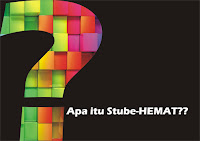 The next session was the introduction of Stube-HEMAT Yogyakarta. Trustha played a video of Stube-HEMAT and its activities. Furthermore, he explained the institution of Stube-HEMAT and activities carried out during 2015, such as training, local exposure, exploring Sumba. In 2016, Stube-HEMAT offered opportunities for three students to become participants of local exposure and six students for exploring Sumba.
The next session was the introduction of Stube-HEMAT Yogyakarta. Trustha played a video of Stube-HEMAT and its activities. Furthermore, he explained the institution of Stube-HEMAT and activities carried out during 2015, such as training, local exposure, exploring Sumba. In 2016, Stube-HEMAT offered opportunities for three students to become participants of local exposure and six students for exploring Sumba.
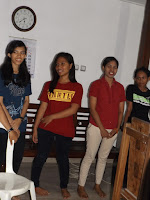 Stube-HEMAT, as a forum for alternative activities for students opened opportunities to learn particular topics which were not learned in their campus. Students were encouraged to identify themselves and to recognize their potency and to be smart to choose activities that support his/her potency.
Stube-HEMAT, as a forum for alternative activities for students opened opportunities to learn particular topics which were not learned in their campus. Students were encouraged to identify themselves and to recognize their potency and to be smart to choose activities that support his/her potency.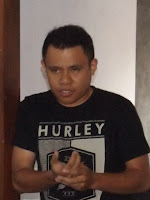 Rudi, one of the participants studying Sociology at Atmajaya University, Yogyakarta said, "I am as the representative of our organization, thank to Stube for the invitation and feel so impressed by the hospitality. First of all, I really appreciate this invitation because this is the first time for me to attend a meeting like this. Commonly other institutions usualy distinguish their spiritual activities and social ones, while Stube-HEMAT combines both.
Rudi, one of the participants studying Sociology at Atmajaya University, Yogyakarta said, "I am as the representative of our organization, thank to Stube for the invitation and feel so impressed by the hospitality. First of all, I really appreciate this invitation because this is the first time for me to attend a meeting like this. Commonly other institutions usualy distinguish their spiritual activities and social ones, while Stube-HEMAT combines both.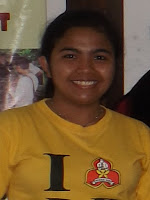 Putry studying in Mathematics Education of Sarjana Wiyata University added, "Formerly, I participated in Stube because of invitation from Frans and I asked him many questions about Stube and its activities. Finally, I decided to join the training, Global Education training. I was so happy because during the training I met various speakers, developed myself and shared knowledge to other friends. It encouraged me to join other activities of Stube. Because of Stube-HEMAT, I have chances to meet many capable people."
Putry studying in Mathematics Education of Sarjana Wiyata University added, "Formerly, I participated in Stube because of invitation from Frans and I asked him many questions about Stube and its activities. Finally, I decided to join the training, Global Education training. I was so happy because during the training I met various speakers, developed myself and shared knowledge to other friends. It encouraged me to join other activities of Stube. Because of Stube-HEMAT, I have chances to meet many capable people."by adminstube
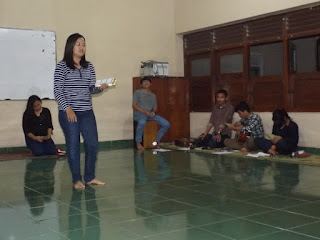 The service ended at 8.30 PM and continued by Indah, team of Stube-HEMAT Yogyakarta to introduce the institution and its activites. Indah told that Stube HEMAT is an institution which serves students to know the social issues and facilitates them to have experiences with exposure activities in order to plunge into reality and understand the problems happened in society. For those coming from regions outside of Java, Stube-HEMAT offered a chance for going home to do certain activities, such as work orientation, local potency mapping or observe local problem. The program called Local Exposure may be done during the semester break. For those who are interested in having new experience, Stube-HEMAT provides a program to explore Sumba. The participants will share their knowledge for students in Sumba.
The service ended at 8.30 PM and continued by Indah, team of Stube-HEMAT Yogyakarta to introduce the institution and its activites. Indah told that Stube HEMAT is an institution which serves students to know the social issues and facilitates them to have experiences with exposure activities in order to plunge into reality and understand the problems happened in society. For those coming from regions outside of Java, Stube-HEMAT offered a chance for going home to do certain activities, such as work orientation, local potency mapping or observe local problem. The program called Local Exposure may be done during the semester break. For those who are interested in having new experience, Stube-HEMAT provides a program to explore Sumba. The participants will share their knowledge for students in Sumba. In fact, this program was new for the participants and some of them were interested to join the program. The problem they face was their system of their campus. If they fail one subject, they must repeat it next two semesters. It means that they have to wait one year. For those who already have finished theory will be more flexible to join.
In fact, this program was new for the participants and some of them were interested to join the program. The problem they face was their system of their campus. If they fail one subject, they must repeat it next two semesters. It means that they have to wait one year. For those who already have finished theory will be more flexible to join.
by adminstube
by adminstube
 Many reused bottles of 1.5 litre bottle was arranged neatly to form a pyramid. The luminescence of multicolor lights flickered bonded this structure. Apparently, this bottles structure was intended as Christmas tree, the icon of Christmas celebration. What a unique and creative style of students who study environment to reuse bottle litter.
Many reused bottles of 1.5 litre bottle was arranged neatly to form a pyramid. The luminescence of multicolor lights flickered bonded this structure. Apparently, this bottles structure was intended as Christmas tree, the icon of Christmas celebration. What a unique and creative style of students who study environment to reuse bottle litter.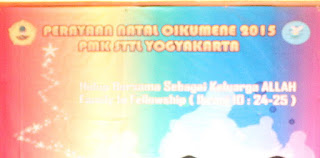 On Saturday, January 9, 2016, ITY campus hall became serene during the worship and more solemn when Rev. Sarlin Riri delivered the words of God. She said that peace needed no complex steps. Making peace was like what Mother Theresa has commanded, ‘go home and love your family!’ The world was lack of love. Wars broke everywhere. Many debates and disputes occured. Food crisis and the raising price of basic commodities happened recently.
On Saturday, January 9, 2016, ITY campus hall became serene during the worship and more solemn when Rev. Sarlin Riri delivered the words of God. She said that peace needed no complex steps. Making peace was like what Mother Theresa has commanded, ‘go home and love your family!’ The world was lack of love. Wars broke everywhere. Many debates and disputes occured. Food crisis and the raising price of basic commodities happened recently.by adminstube
Web Archive
2025 (17)Total: 485
Youtube Channel
Lebih baik diam dari pada Berbicara Tetapi tidak ada Yang Di pentingkan Dalam Bicaranya
-->


